🔥 We just launched Topicfinder: the most a powerful content research tool! Try it Free Take The Tour!
- Freelance Writer Rates: What's a Normal Per Word or…

Freelance Writer Rates: What's a Normal Per Word or Hourly Rate?

If you're a business looking to get a writer to handle your blog, you will run into the complex world of pricing. Some writers charge a lot! Some charge a minimal amount. You might be suspicious of the price points you see, and with good reason. There are a lot of questions that spring up.
- Is this rate higher than the service is worth?
- Is this rate lower than the service is worth?
- Does this rate include additional non-copywriting services?
Pricing for writing can be broadly varied, and there are many considerations that you should keep in mind. I want to do what I can to elucidate freelance writing rates with some guidelines for those who haven't been steeped in it for a decade as I have.
Let's dig into the subject, shall we?
Varying Pricing Methodologies
There are generally four pricing models for writing. This post is largely focused on one (pay-per-word articles), but I want to touch on the others as well.
Price Per Word
One of the most common pricing models is the per-word model. Content mills like Textbroker commonly use the pay-per-word model, and it's the model used by many freelance writers and used throughout various publishing programs.
This model is great because you pay for exactly what you get, no more, no less. You know what you're ordering, and the writer provides.
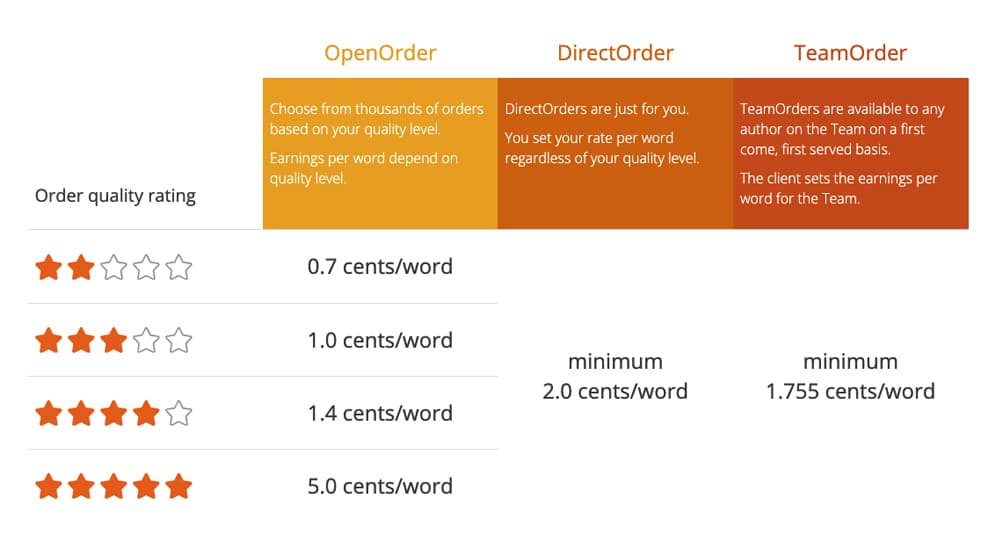
It has a few drawbacks, though.
- Unless your writer strives to write the exact word article count every time – to the point of adjusting sentences to meet it – your precise cost per week/month will vary. It will usually be within a specific budgetary range, but the price will change with every new article.
- A sentence full of fluff and a sentence tightly focused on the subject cost the same. Low-tier writers will fluff up their posts to get paid for less effort on their parts.
- Additional Services. Do you want the writer to research, publish through your CMS, and find and use images? You'll have to negotiate additional fees for those services.
I'll talk more about this model throughout this post since it's the article's subject as a whole. For now, suffice to say that it's ubiquitous in this industry, though not always the best.
Price Per Project
The second option, which is very common amongst mid-tier and high-tier freelancers, is a price-per-project model, and it's also prevalent in the publishing industry. For example, novelists get paid per project at a flat rate, with an advance and a cut of profits from their future sales.
Pricing per project has some advantages, like stability. You know that, say, a given blog post will cost you $200 every time you order one, regardless of subject, exact word count, or complexity. These predictable flat fees can be good for both businesses and writers, who value consistency.
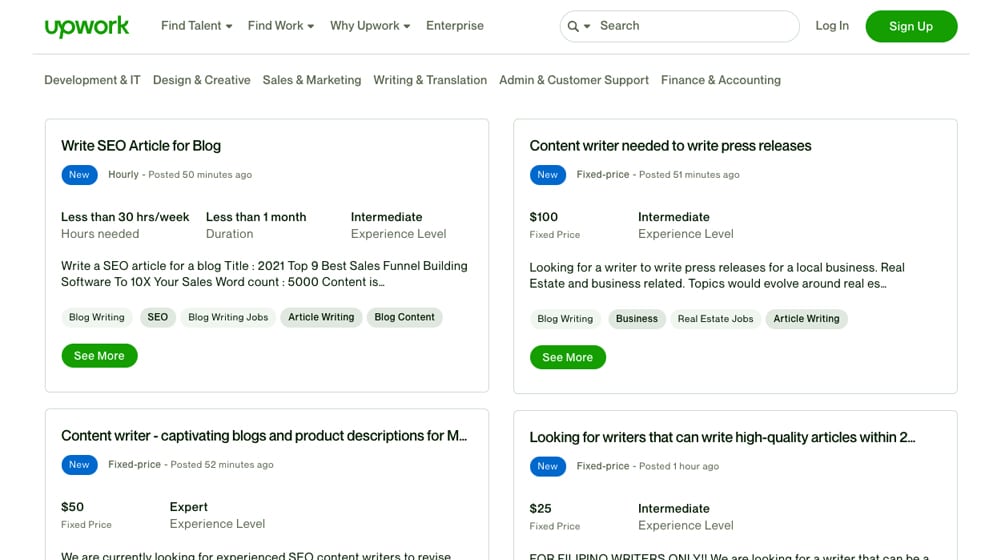
On the other hand, the price per project cannot include additional services, like research/images/publishing. It depends on whether you're hiring the writer to write copy or manage content, and one will be somewhat more expensive than the other.
Price Per Hour
A per-hour rate is familiar with some types of freelancing but not with others. In the world of blogging and copywriting, a per-hour rate is typically seen with freelancers who do more than just content writing. If they're doing research, finding and editing images, handling publication, handling promotion, monitoring analytics - all of that requires money, and the easiest way to charge for it is a per-hour rate.
A per-hour rate can be more expensive (or less expensive) than comparable services in other pricing plans. Freelance writer rates vary a lot and depend on their efficiency, the services rendered, and more. I often find that it's more expensive, but it changes from freelancer to freelancer.
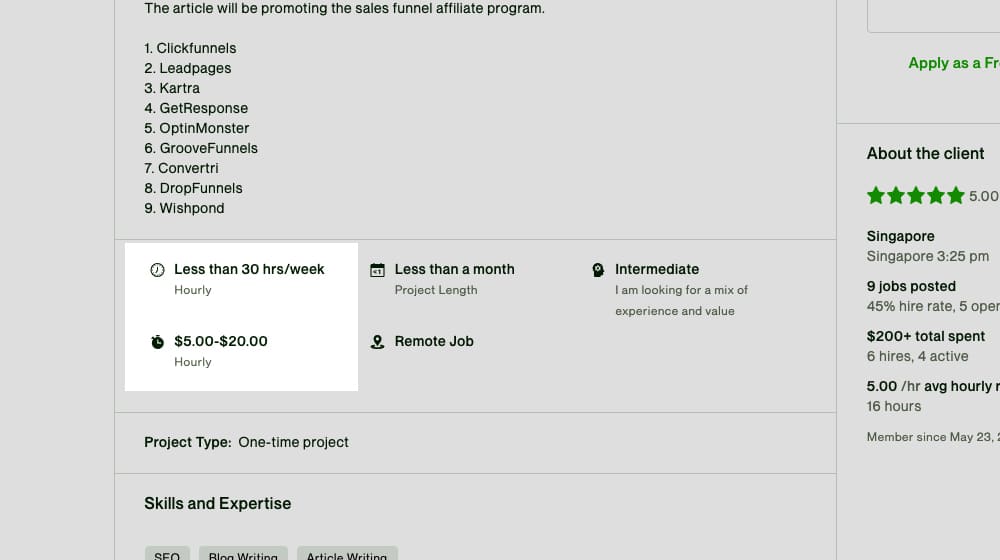
Whether you decide to hire a part-time or full-time writer, be mindful that there are only so many words of quality content that a person can create in a certain amount of time. Depending on the type of content, a single blog post can take an entire day, and a whitepaper could take a full week. As an extreme example, a large eBook can take months to finish. Hiring a writer by the hour doesn't necessarily mean you can squeeze as much as possible out of them and maintain a high level of quality.
Retainer Pricing
Retainer pricing is the ultimate in stability but runs into other problems. Essentially, you pay your freelancer a fixed fee each week/month, and they render services as needed. Sometimes that might be 10 hours' worth of work; sometimes, it might be 30. If the work adds up too much, the freelancer might want to negotiate a higher rate to better compensate them for the work they're doing. Or, you may just end up with a large invoice at the end of the month for your entire content calendar .
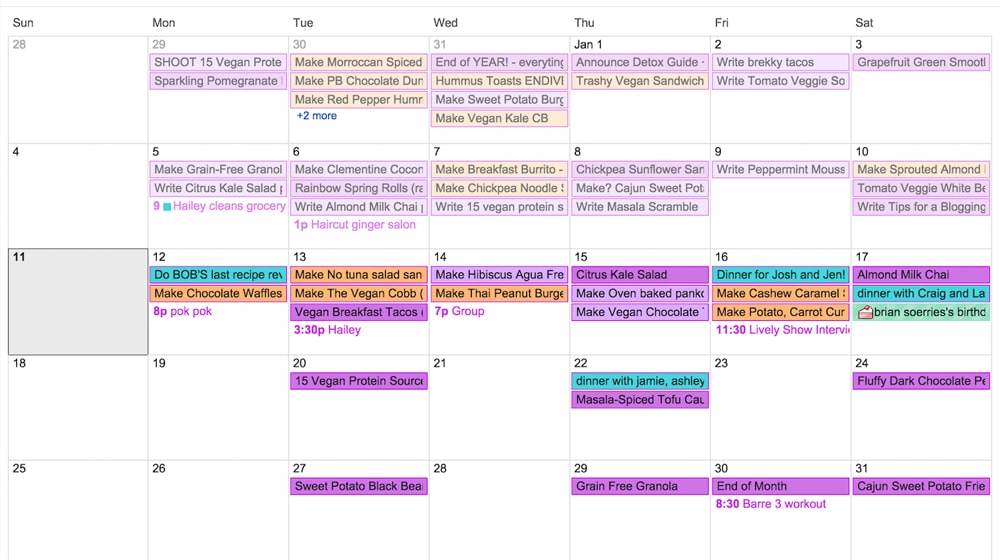
The biggest issue with this is that it becomes very similar to a salaried position . In that case, you can run into labor laws that require you to classify them as an employee rather than a freelancer, with all the details that entail, like benefits and other labor laws.
On the other hand, you might pay them a fixed monthly fee for a set amount of work, like when you're contracting a content marketing agency. Then you're simply hiring an outside firm to handle outsourcing your content marketing.
Is one of these models better than the others? Not really. They all exist because there are use cases for them, and it all depends on the services you need and the individuals or companies offering them.
Good, Fast, Cheap: Pick Two
There's common wisdom in commerce that there are three qualities every service can have: it can be good, it can be fast, and it can be cheap.
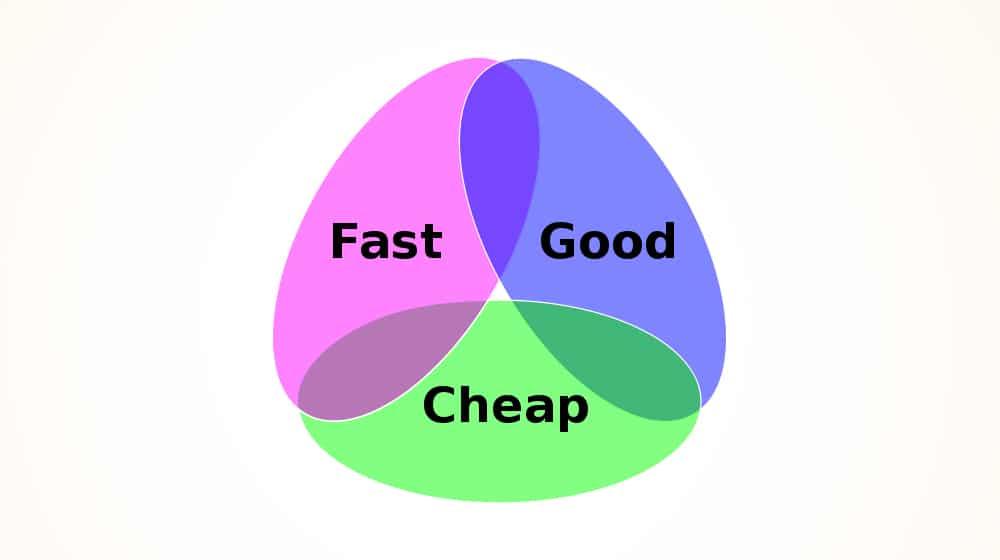
You can never get all three; you have to pick two.
- Good, fast work won't be cheap.
- Good, cheap work won't be fast.
- Fast, cheap work won't be good.
This saying became popular because work requires investment . You can invest in either time or money. You can get good work for a low rate if you don't have time constraints. You can get good work fast if you have the money to spend on prioritizing it. And, if you don't want to invest time or money, you can get work, but it won't be good.
I have to bring this up because one of the pitfalls of per-word pricing is very little reinforcement of this triangle. Per-word rates can be below-average and will still give you great content if you give the freelance writer time to make it. However, the writer gets paid the same amount whether they give you their project in a day or a month.
From the writer's perspective, they have to balance their work with numerous clients, prioritizing the projects with the best effort-to-return ratio. If your project is very complex, and someone else's is simple, they'll write the straightforward content first. You have to wait simply because someone else is asking for less.
This scenario can even vary from week to week, and different volumes of work at various times change the equation for the freelance writer. They also have to consider longevity; if they go above and beyond to work with you, are you more likely to stick with them for years, or do they suspect you're only in it for a few weeks or months? They'll usually prioritize consistent work over valuable work because it eliminates a significant source of stress for a freelancer.
The Broad Range of Per-Word Prices
If you spend any time looking for a freelance content writer online, you'll see a large variety of freelance writing rates, from a penny per word to $1.50 per word or more.
We create blog content that converts - not just for ourselves, but for our clients, too.
We pick blog topics like hedge funds pick stocks. Then, we create articles that are 10x better to earn the top spot.
Content marketing has two ingredients - content and marketing. We've earned our black belts in both.
Let's dig into each of the different rates and pricing tiers and what you can expect from them:
At the cheapest level, you can find writers offering their services for $0.01 to $0.03 per word.

These writers typically fall into one of a few categories.
- For such a low price rate, it's barely worth spending time looking into a topic. These writers will Google the subject, find content that suits, run it through an article spinner or quickly rewrite it and send it over. This is especially common with gigs on freelance writing businesses, content mills, and other affordable writing services.
- At such a low price, it's entirely possible that the freelance writer finds content out in the wild, copies and pastes it for you, and calls it a day. You aren't paying enough for original thought, after all.
- ESL/Foreign. Sometimes a writer lives in a region where the cost of living is so low that they can charge a low fee and still make a decent living. In many cases, the writers are often not entirely familiar with the language you want them to write in and might produce sub-par content. Grammatical errors, typos, and funky-sounding paragraphs could kill your rankings.
- Poor Quality. Good, Fast, Cheap; you've picked Cheap. Good is relative.
- You'll rarely find a good blogger toiling away for sub-par rates. It's possible, of course, but it's hard to say how long that situation will last and if they'll remain reliable.
These situations are, of course, usually why it's better to avoid these price ranges when creating writing jobs. Sure, you might find a diamond in the rough, but you'll have to dig through a lot of freelance writers to get one, and it's not worth the time, effort, or energy to sort through. These are mostly brand new writers or individuals who speak English as a second language.
Quality articles can take days to write when you factor in research, graphic design, editing, formatting, optimizing, and other critical steps.
Middle-Tier
A somewhat higher level price rate is around $0.05 to $0.20 per word. This rate is middle-to-high-end content mill writing, the kind of content you see at the 4-5-star level on sites like Writer Access or Upwork, and the quality you'll find in private teams and curated love lists. It's uncommon to find any quality assignments on most of these websites, as most open assignments are 500-word articles on average or occasional 1,000-word articles.
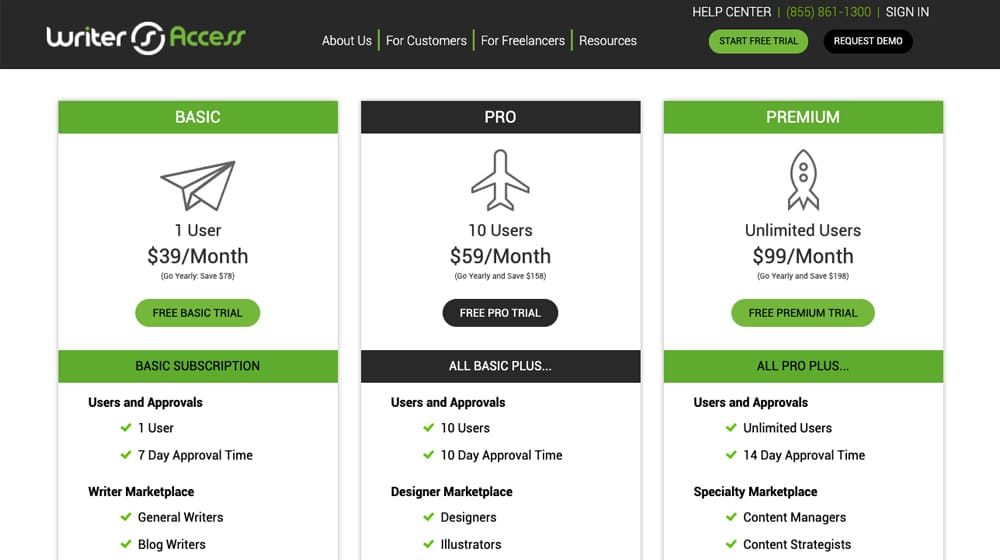
This rate range is also the rate for freelancers who are confident in their skills, produce decent content, and either lack confidence or lack a client list.
Remember that if you're going through a content mill, the freelance writer is getting paid less than you're paying. The mill takes their cut, after all. They do provide a service – they protect you from bad writers, protect writers from bad clients, and do copyright checks – but if you can handle that on your own, a content mill isn't worth it.
Working with a freelancer directly when they charge this much is the peak of the bell curve, where the majority of businesses and freelancers work. It's a reasonable rate and a natural balance between price and quality.
The higher tiers of freelancing are all over the place. There are experienced writers out there working for high rates between $0.25 to $1.50 per word, and that's an extensive price range. The quality between those ranges could vary drastically, or not at all.

This range is hard to generalize because there aren't many writers capable of producing content at this price point. More out there think that their writing skills place them in this category, but it's very uncommon, and they don't have a lot of success with repeat clients. Plus, the writers genuinely worth this price are hard to find because they tend to find a stable client or a writing career and roll with it. They don't actively seek more work because they don't necessarily have to.
These top-tier writers usually have personal blogs of their own, and they may be industry authorities and icons themselves. At that point, you're barely hiring them as writers; your pay rate is a consulting fee to produce content for you.
These writers do a lot more than write, too, of course. They do SEO work, social media marketing, and email marketing, they can promote content with their audiences, and they do everything required for your content to succeed with little to no revisions. They usually have a wide range of high-profile clients, years of writing experience, and their articles are very successful. They're worth every penny, but they don't come cheap, and you'll never have to worry about proofreading.
Traps and Pitfalls
When hiring a freelance writer to handle your blog, you have a lot to think about.
One of the most common mistakes I see people make is when they cheap out on services. You have a small budget and want to conserve it, so you hire writers for low prices.
This practice is a mistake because it's going to get you nothing. Sure, you'll get writing, but is the writing any good? Or is it absolute surface level, bare-minimum kind of stuff? Does it have any focus on SEO, any deep research? Probably not.

When you under-pay for content, you lose out on:
- You're not paying the writer enough for them to think about what they're writing or perform the necessary research. It might be information off the top of their head or thin surface-level content that doesn't satisfy your visitor's search query.
- A writer who is an expert in a subject is going to charge expert rates. Everyone else is just parroting Google search results.
- Additional services. Promotion, research, SEO, images, fact-checking; all of these are services that you don't get when you pay a low rate.
Remember, writing is just part of the content marketing process; marketing is the other half. User experience, CRO, and SEO are equally important, and if somebody isn't doing those things, then your content won't perform as well as it should.
That is, a shotgun filled with birdshot fills the air in a given zone with pellets, increasing the likelihood that at least one of them will hit a flying bird. The bird is small and fragile, so only one shot needs to hit.
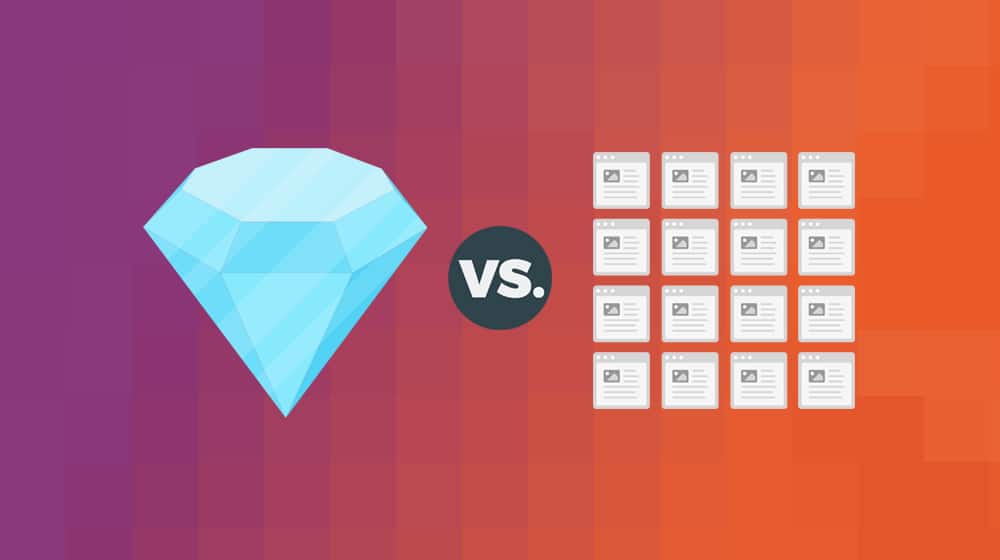
In blogging, the concept then becomes, the more blog posts you have published and produced, the more likely one is to hit an audience and go viral. This strategy is how sites like HuffPo and Buzzfeed got their start.
The problem is that the less investment each post has, the smaller the pellet and the broader the area it must fill. The overwhelming majority of businesses cannot afford to fill the air with enough pellets to succeed. They try to hire cheap freelance writers to produce new posts every day, and it just doesn't work.
What works much better is condensing that budget into single shots, with the time taken to aim. A single shot with one hit, that's all you need. It's more expensive per post, but you only need one post weekly; the frequency isn't that important .
Write Right
I strongly encourage everyone to invest in high-quality writing, especially when your writer is ghostwriting your content and your name and face are on it.
You want that "Good" in the "Good Fast Cheap" triad at all costs, and it's up to you to balance whether you're investing in it with time or money. I recommend money. If you invest money into blogging and start slow, once your blog begins to bring in returns, you can reinvest those returns in ramping up your blog. It's harder to do that the other way around.
James Parsons is the founder and CEO of Content Powered, a premier content marketing agency that leverages nearly two decades of his experience in content marketing to drive business growth. Renowned for founding and scaling multi-million dollar eCommerce businesses through strategic content marketing, James has become a trusted voice in the industry, sharing his insights in Search Engine Watch, Search Engine Journal, Forbes, Entrepreneur, Inc, and other leading publications. His background encompasses key roles across various agencies, contributing to the content strategies of major brands like eBay and Expedia. James's expertise spans SEO, conversion rate optimization, and effective content strategies, making him a pivotal figure in the industry.
Join Thousands of Marketers and Get Free Tips Weekly!

Related Posts
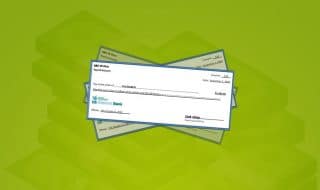
What is The Average Salary of a Full Time Blog Writer?

The Pros and Cons of Hiring a Freelance Blog Writer

What’s a Content Writers Mill and Should You Use One?
January 27, 2022 at 6:57 pm
Thank you! This gives me a good idea of how much I should budget for this. I definitely agree that investing in high-quality writing is a must.
January 28, 2022 at 5:22 pm
Thanks, Bryce! I'm happy this was useful to you. Good luck with your hire!
September 09, 2022 at 11:25 pm
Hi! Are blog writing rates different from say, writing an instruction manual? I found this content very useful by the way, thank you!
October 07, 2022 at 7:59 pm
You're welcome!
This is called "technical writing" and it's usualy more expensive than ordinary article writing. I wrote a guide on Technical Writing here: https://www.contentpowered.com/blog/guide-what-technical-writers/
December 03, 2022 at 7:24 am
This is very helpful and insightful. How we can find long term clients who can pay us well!
December 05, 2022 at 1:50 pm
Thanks Monika!
My best advice is to apply to jobs on job boards, write cover letters, and do a great job for those clients. After picking up a handful of different clients you'll find that some are more stable and like your work better than the rest, and you can focus your efforts more on your best clients.
Leave a Reply Cancel reply
Name (required)
Email (will not be published) (required)
Your Comment
Let’s Grow Your Business
Want some free consulting? Let’s hop on a call and talk about what we can do to help.

Home » Blog for writers » How to calculate your freelance writer hourly rate
- April 9, 2020
How to calculate your freelance writer hourly rate

“The three most harmful addictions are heroin, carbohydrates and a monthly salary.”
Nicolas Taleb
Being a freelance writer comes with many challenges . And, like any other job, one of the main concerns is no doubt the financial side of things. Sure, we write because it’s our passion, but there’s nothing wrong with getting paid for it in the process! Unlike typical nine-to-fivers, however, our salaries don’t pop automatically into the bank. In fact, freelance writer rates can be pretty complicated. This blog post explains how to calculate your freelance writer hourly rate, no matter how you charge.
If you charge per word

The pivotal decision, however, is deciding how much you should actually charge per word without overcharging the client while at the same time, making sure that you are paid what you deserve.
Let’s take an example. Say you are being asked to write a 1000 article, and decide you want to charge your client 5c per word. That means you know upfront that you will be earning €50 for this article. Now imagine that the article doesn’t involve much research, and you know for a fact that it will take you more or less an hour to complete. You are thus being paid €50/hr for a job that took you the absolute minimum amount of time and effort. Which might be fine for you, unless that same client assigns you an article of the same length, but requires hours and hours of research. How much will you charge now?
Charging a flat rate per word is very convenient. This is because you will know exactly how much you will be paid for every task you take on. One word of advice, though: don’t forget to calculate how much time you are likely to spend on the task, before calculating how much you want to be paid by the hour and then giving your client a quotation based around this calculation:
Desired rate per hour x Time taken / Number of words
If you charge per page
Charging per page makes more sense for longer projects. A proofreader asked to correct a 300-page novel, for example, will probably find it easier to charge per page rather than per word. Similarly, a ghostwriter may also choose to charge per page for a written book. Your rate per page will depend on the average length of each page – if this varies widely, it might also be wise to specify a limit (eg. €x.xx up to 500 words/page). You will also need to factor in the time it will take you to finish the whole thing, as it will probably span over a number of days or weeks depending on how long the task is, as well as your current workload. The following calculation will help you settle on a suitable rate per page:
Desired rate per hour x Time taken (approx.) / Number of pages
If you charge per project
Typically, the more experienced writers among us take on what can be seen as projects. These may range from running ad copywriting, to regularly published articles on magazines and other similar publications, to blog writing and creating SEO-optimized content for websites. Once again, you need to factor in the time the project will take you to complete, as well as the research and effort it will take you. Sometimes, a volume-based discount may be applicable. In this case, you will need to negotiate a contract.
Calculating your freelance writer hourly rate: A rule of thumb
We realise that all this may seem a tad confusing, so we have a little rule of thumb to help you out. And the first thing is to decide how much you want to earn per year. Once you know that, you can divide the amount by 12 to come out with a pseudo-monthly salary. Divide that by the 160-hour typical working month and walla – you have an hourly rate for all your toil. But that should only serve as a rough guide, as we’ve hinted to above.
Don’t forget your overheads
The absolutely last step to calculating your freelance writer hourly rate is considering your expenses. If you’re renting a co-working space or office, you should add that cost to your desired salary. The same goes for any other expenses you could run up, though, if you’re perfectly comfortable working from home, your expenses should be negligible.
Become a writer at Topcontent and you don’t need to calculate freelance writer hourly rates
If you’re a better writer than mathematician and these calculations have you breaking out a sweat – worry not! Our Topcontent writers can pick and choose the tasks they like from an open task board that also displays how much they will be paid for it. They can work as much or as little as they like – so they have ultimate control over their monthly salary.
Follow the Topcontent sign up process today if you’re interested in making the leap into a freelance career ! We offer professional content writing services for online businesses, and we are always looking for experienced writers to join our team.

Kylie Grech
Recent posts.

Interview with Lieve

How to be a successful remote employee – Eight main characteristics

What does “No filler or fluff” mean in content writing?
Freelance Content Writer Rates
- Post author:
- Post published:
- Post category: Content Writing
When it comes to finding freelance content writers, you may be wondering how much I charge my clients. Rates vary depending on the type of client you work with, the length of the project, the complexity of the material, as well as the writer’s experience. The average hourly rate for an freelance content writer ranges from $25 to $50 per hour. An beginner level writer may charges the little as an $15 an hour, while a more experienced writer can charges up to $75 for an hour.
When it come to project based rate, the total cost depending on the number of words and the complexity of the material. Generally, writers charge between $0.05 and $1.00 per word. For example; a 500 words blog post may cost anywhere from $25 to $500, depending on the length, complexity, and experience of the writers.
When considering a writer’s rates, it’s important to check their experience level and the quality of their work. It’s also important to look at the scope of the project and determine how much time and effort it will require. Overall, its important to find the freelance content writer who is both affordable and professional. An experienced, and knowledgeable writer can helps client to create quality content that meet their need while staying within their budgets.
Factors of Depending Content Writer Rates
Are you considering becoming a freelance content writer? Are you already a freelance content writer looking for information on the current rates? The freelance content writer rates vary depending on several factor. First, the type of content you are writing plays a role in your rate. Content writing can include blog posts, website content, email newsletters, and more. Each type of content requires different levels of research, skill, and understanding of the topic. Therefore, the rate for each type of content may be different. Second, the length of the content you are writing affects the rate. For example, a blog post may be a few hundred words while a website page may be a few thousand. The longer the piece, the more time and effort required to complete it, and the higher the rate may be. Third, the industry you are writing for impacts your rate. Those writing for competitive industries, such as finance, may require more research and understanding than those writing for less competitive industries. Therefore, the rate for content writing for competitive industries may be higher. Fourth, the complexity of the writing also affects the rate. Writing about complex topics, such as quantum physics, may require more time and effort than writing about a simpler topic, such as home decorating. Therefore, the rate for complex topics may be higher. Fifth, the amount of time you have to complete the content affects the rate. If the client needs the content quickly, you may need to charge a higher rate to compensate for the expedited timeline. Finally, the experience you have as a freelance content writer affects the rate. Those with more experience may be able to charge more because they have developed a reputation and expertise in the field. Overall, freelance content writer rates depending on the type of content, length, industry, complexity, timeline, and experience. Those just starting as content writers may start at a lower rate and gradually increase as they gain more experience and expertise. Experienced writers may command higher rates, depending on the specific project. When setting your rates as a freelance content writer, it’s important to consider all of these factors. So they can help ensure you are fairly compensated for the work you do. As you continue to gain more experience and expertise, you may be able to increase your rates.
Why do People Choose Content Writing as a Career?
People choose content writing as a career because it offers a flexible schedule, the potential to work from anywhere, and the opportunity to use creativity and imagination in their work. Content writers can uniquely express themselves and their ideas and can be their boss.
Additionally, content writers can specialize in a variety of topics and industries, allowing them to work in an area that interests them. Finally, the job market for content writers is growing, with demand for content writers increasing as businesses recognize the importance of having high-quality content to reach out to their customers.
How Much Content Writers Charge On Freelancing Marketplaces
Content writing is a popular freelance service and is in high demand on online marketplaces. Content writers help businesses create high-quality, engaging content for their websites, blog, or other online and offline marketing materials.
Content writers typically charge by word or project, and the cost can vary greatly depending on the complexity of the project, the writer’s experience, and the type of content being created. For blog posts, content writers typically charge between $0.01 and $0.20 per word. This rate can vary depending on the complexity of the topic, the writer’s experience, and the length of the post. For example, a more experienced writer may charge up to $0.25 per word for a complex technical article.
Web Content Writing Prices
For web content and marketing materials, content writers typically charge between $0.10 and $1.00 per word. This rate can also vary depending on the complexity of the project, the writer’s experience, and the length of the content. For example, a more experienced writer may charge up to $2.00 per word for a complex web project. Ghostwriting content writing prices
For ghostwriting projects, content writers typically charge between $0.15 and $2.00 per word. This rate can also vary depending on the complexity of the project, the writer’s experience, and the length of the content. For example, a more experienced writer may charge up to $5.00 per word for a complex ghostwriting project. Healthcare content writing price
The cost of content writing services can also vary depending on the industry and the type of content needed. For example, healthcare and legal content may require more specialized knowledge, and writers may charge more for this type of content. In summary, the cost of content writing services varies depending on the project, the writer’s experience, and the type of content needed. For blog posts, content writers typically charge between $0.01 and $0.20 per word. For web content and marketing materials, content writers typically charge between $0.10 and $1.00 per word. For ghostwriting projects, content writers typically charge between $0.15 and $2.00 per word.
How Much Content Writers Charge on Local Market
The cost of content writers varies widely depending on several factors, such as their location, experience, and the type of content they are writing. Generally, content writers in local markets charge anywhere from $25 to $100 per hour.
This cost can be lower or higher depending on the writer’s experience and the type of content they are creating. For example; if the writer is experienced, they can command a higher rate.
Likewise, if they are writing more in-depth content such as SEO articles, research reports, or white papers, they may charge more. Ultimately, it is important to discuss the cost of content writing services with a content writer before beginning a project.
How to Get Rich As a Graphic Designer
How Much Does a Freelance Graphic Designer Make a Month
You Might Also Like

Tips to Write High Quality Bio for Redbubble Shop

Ultimate Guide to Freelance Writing for Beginners

How to Become a Freelance Writer Without a Degree
- Skip to main content
- Skip to footer
Peak Freelance
The Community for Freelance Writers
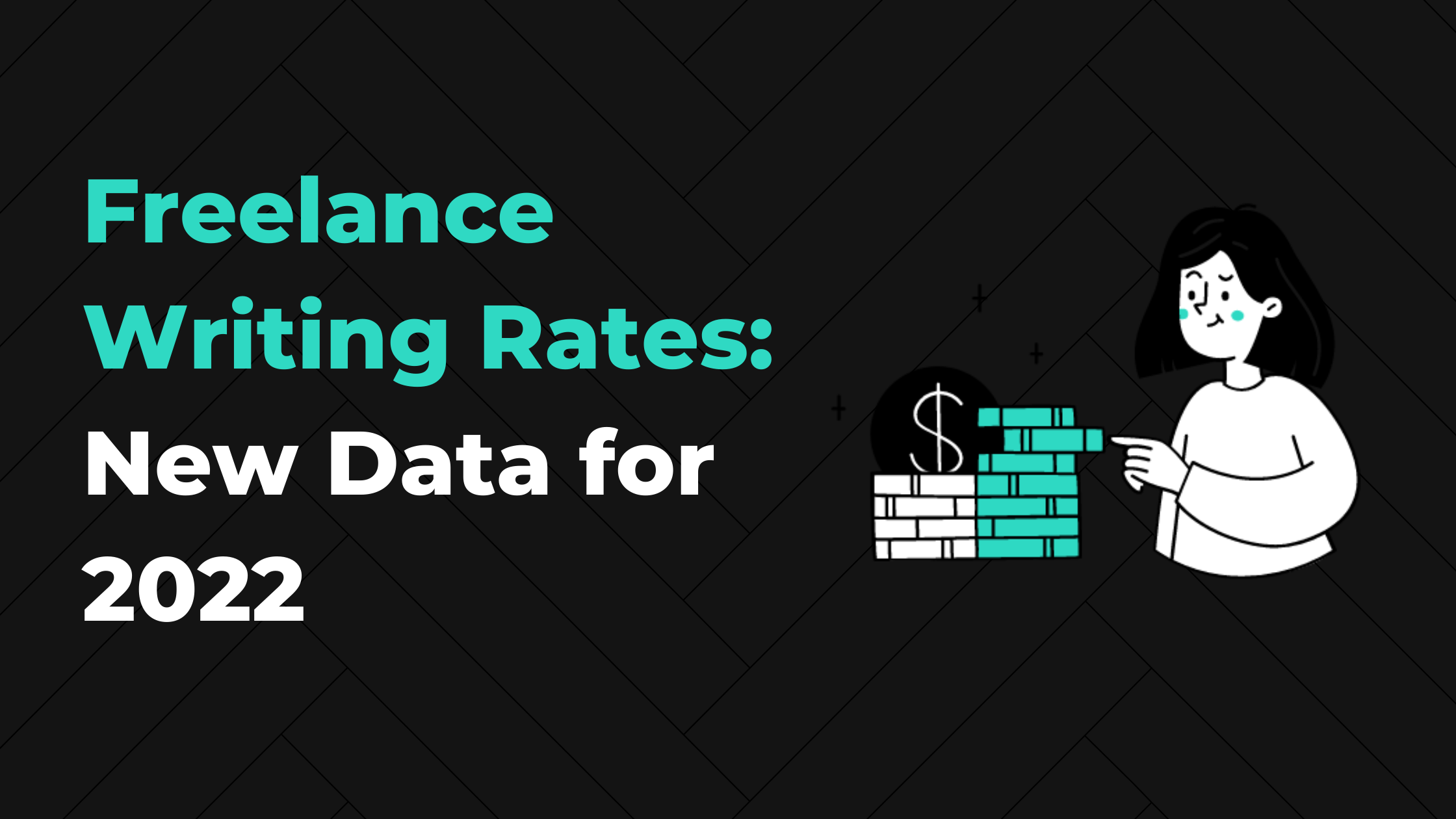
Freelance Writing Rates: How Much to Charge for Freelance Writing Services (New Data for 2022)
posted on 6 November 2022
In this post, we will use a survey sent to 213 part-time and full-time freelance writers to determine the average freelance writing rates. Using that data, we’ll answer a question we’ve heard quite a bit in the industry.
What should I charge?
Of course, a new writer isn’t going to charge $1,000+ per article after one day. Writing rates are meaningless if you can’t provide the client value and ultimately drive leads and revenue for them.
And every writer is different in terms of (1) how quickly they can write, (2) pricing models, and (3) business goals.
So, in this review, we’ll use the new data gathered, plus our experience doing freelance writing for enterprise clients and other companies, to give you the insights you need to:
- Charge competitive rates that make the most sense for your freelance business
- Get the most out of your marketing efforts by targeting the right channels for leads
This a big post, so here’s a snippet of the patterns that emerged when we poured through the data:
What’s a fair freelance writing rate?
- $250 to $399 is the most popular rate for a 1,500 word blog post.
- $500 to $999 is the most popular rate for writing a whitepaper.
- The most popular pricing model is per project.
Key findings 💡
🙌 All freelancers earning over $100K have been writing for 2+ years. 👻 Most writers don’t charge extra for ghostwriting. Of those who do, the majority charge a premium of between 16% and 20%. 💰 Word-of-mouth referrals are the biggest sources of high-paying freelance writing gigs.
Methodology
In this edition of Peak Freelance’s annual Freelance Writing Rates report, we surveyed 213 freelance writers to gain perspective on what they charge for writing services.
Writers ranged from newbies (less than a year) to industry vets with over 11 years of experience. We asked questions around finding high-paying gigs, scope creep, and displaying rates on websites.
We encourage you to share the text, data, and graphics in this report. Please cite and link back to the original.
Thoughts from our founders
We sat down with Michael Keenan and Elise Dopson, the founders of Peak Freelance, to get their reaction to the data and see what it means for freelancers in the year ahead.
- The amount of ecommerce writers surveyed was surprisingly low! I think we’ll see more writers specialize in ecommerce in coming years as brands establish their digital presence. They’ll need resources and education to market to consumers online, and freelance content writers can help them improve SEO, produce high-converting landing pages, and more.
- Average freelance writing income was at a lower rate than I expected. There is room for improvement and resource development to help writers build their skill sets, provide more value, and charge more. Community and education will be a strong theme in 2022.
- I was shocked that most writers aren’t charging more for ghostwriting services. I’ve always felt if you aren’t getting the byline, you should charge a premium for your work. A good reminder for everyone as we move into a new year!
- I was surprised to see how experience impacts the rates freelancers charge. This likely boils down to a few things: testimonials and results to back up your work, and the confidence to charge higher rates. Beginner’s charged very low rates and found clients on content mills like Upwork.
- Whitepapers are massively undercharged for. This format has huge revenue potential for clients; they easily see how much money (or leads) they’ve collected off the back of it, which is often in the thousands. Writers: charge a reasonable rate!
- One in five six-figure writers find high-paying writing gigs through communities. I totally identify with that… hence the creation of Peak Freelance 😉
The state of freelance writing in 2022
Freelance writers have been important business assets for years. When COVID-19 emerged and businesses and consumers moved online, freelance writers and content marketers became even more in demand.
To understand how many freelancers arose through a pandemic, 16% of freelancers started less than a year ago as of November 2021. Some 19% reported freelancing for between one and two years. Though the majority of freelancers (65%) have been writing professionally for between two and 10 years.
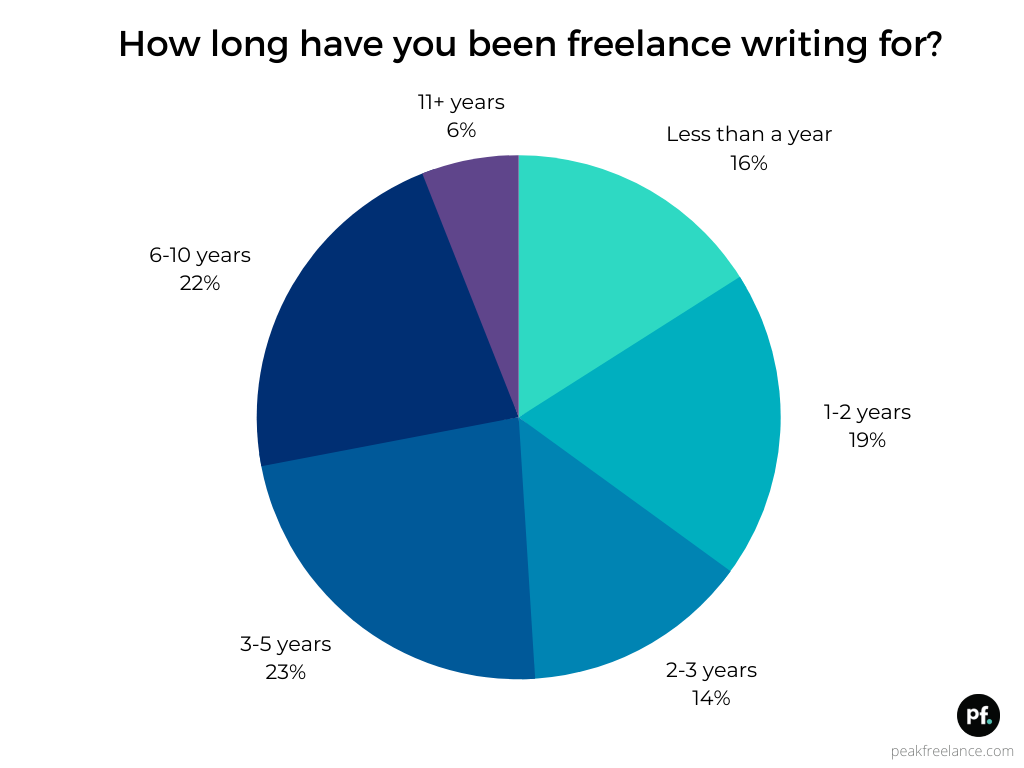
When we dove into freelance writing niches, one industry was more popular than others.
Some 27% reported working in software (SaaS). Another 14% wrote for agencies , and 12% wrote for ecommerce.
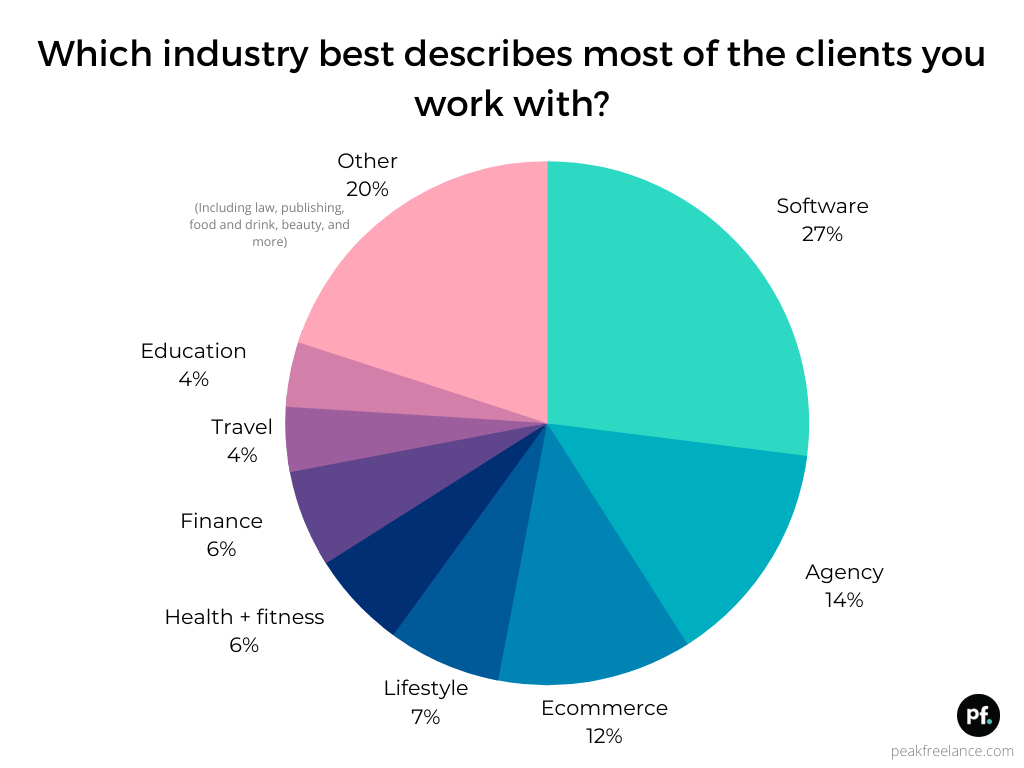
Understanding what niches writers work in leads us to the next section. We wanted to know how much people were changing. So, we asked freelance writers to disclose their yearly earnings.
More than half of freelance writers earn less than $30K per year 💔
The next income level was $31K and $50K, with 18% of freelance writers claiming that was their annual freelance income for 2020. When you combine the percentages of these two groups, almost three quarters of freelance writers make less than $50K per year.
That suggests there is room for business improvement in a majority of freelance writer’s businesses. Think about your own operations. Where can you provide more value for clients to charge more?
Of the remaining writers in the survey, 9% said they made six figures. Some 5% reported making between $100K and $125K, and 4% earned over $125K in 2020.
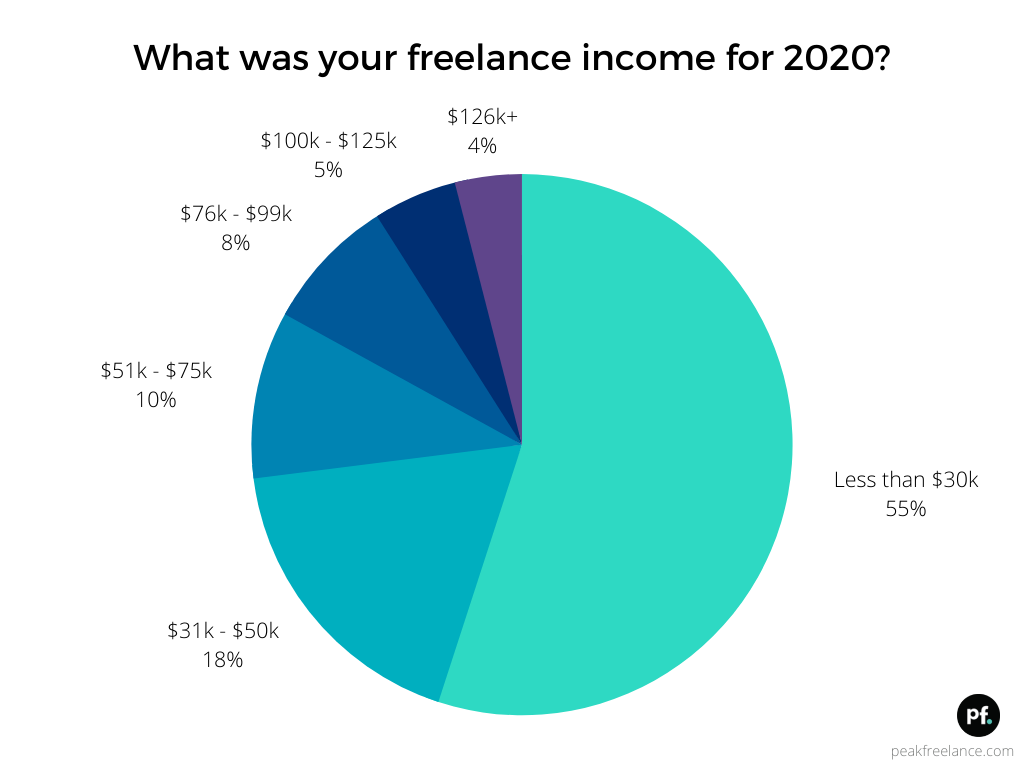
When it comes to time spent versus income as a freelance writer, the longer you’ve been around, the more you earn.
It’s probably no surprise that people bringing in larger incomes have been in business for longer. If we look at those who’ve been freelance writing for less than a year, the vast majority (91%) earn less than $30K.
To reach the six-figure salaries, it seems you need to have been working on your business and growing it for at least a couple of years. Of those earning over $100K, all have been freelance writing for at least two years, with 65% writing for more than six years.
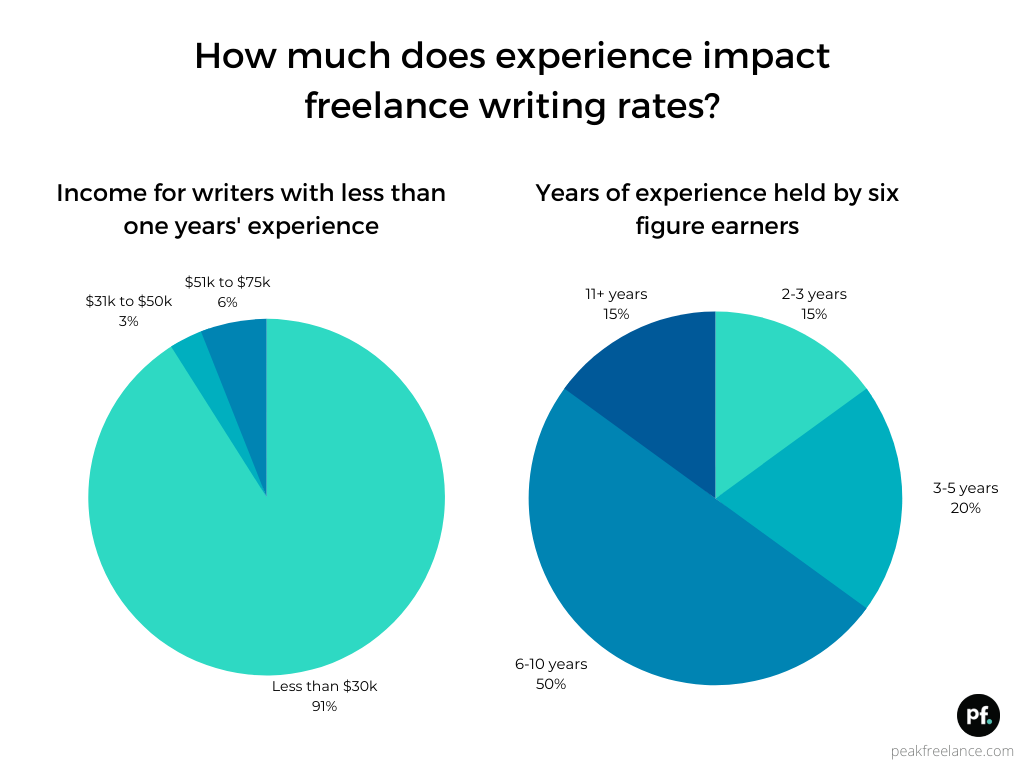
💰 Read about how Peak Freelance’s very own Elise Dopson grew her freelance writing business to six figures over three years.
How much should freelance writers charge?
As noted earlier, the majority of freelancers earn less than $50K, with a small percentage of writers making over $100K per year. Because of this, we wanted to know what price writers charge for different services.
The average freelance writer charges $250-399 for a blog post
Blog posts are one of the most popular freelance writing services, with the vast majority (98%) offering it to clients. A brand’s desire for regular content and a strong presence in the search engine results page means they tap into freelance writing talent to produce blog content.
So, what do freelancers charge for blog posts?
Between $250 and $399 was the most popular response, with 27% of respondents saying this is what they’d charge for a 1,500 word blog post. Just 8% charge four figures or more.
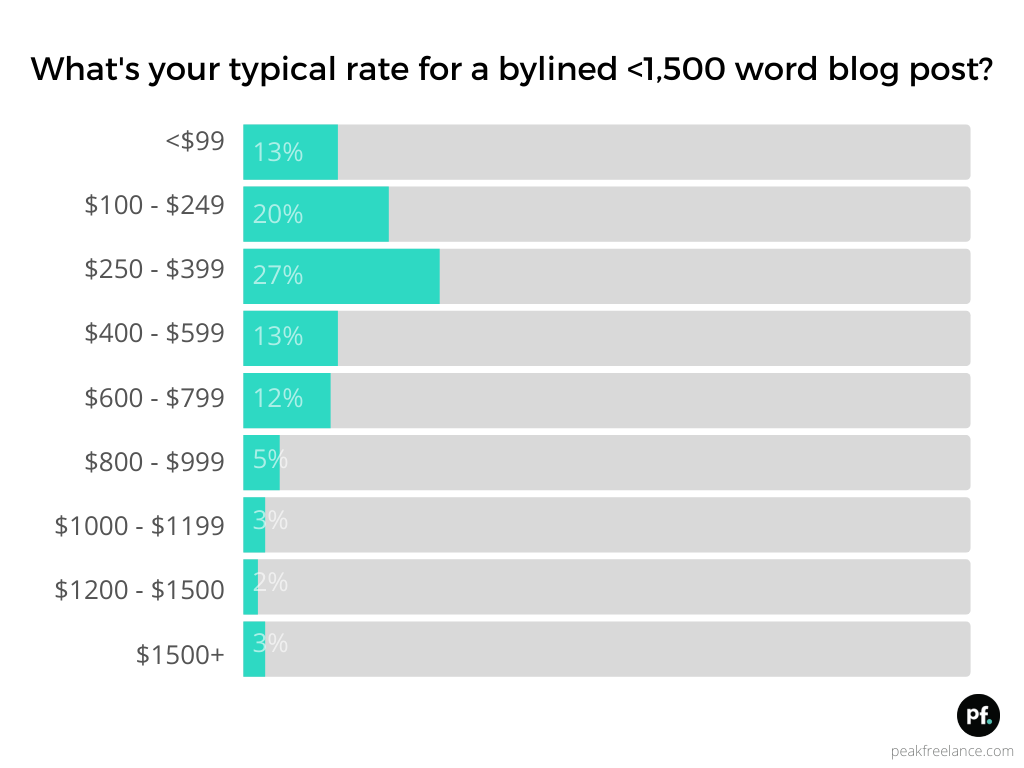
How much you charge per blog post impacts your overall earnings. Of writers that break the six-figure yearly income mark, half charge at least $1,000 per blog post. A quarter demands more than $1,500 for a single 1,500 word article.
Just 10% of six-figure freelance writers charge less than $399 for a blog post.
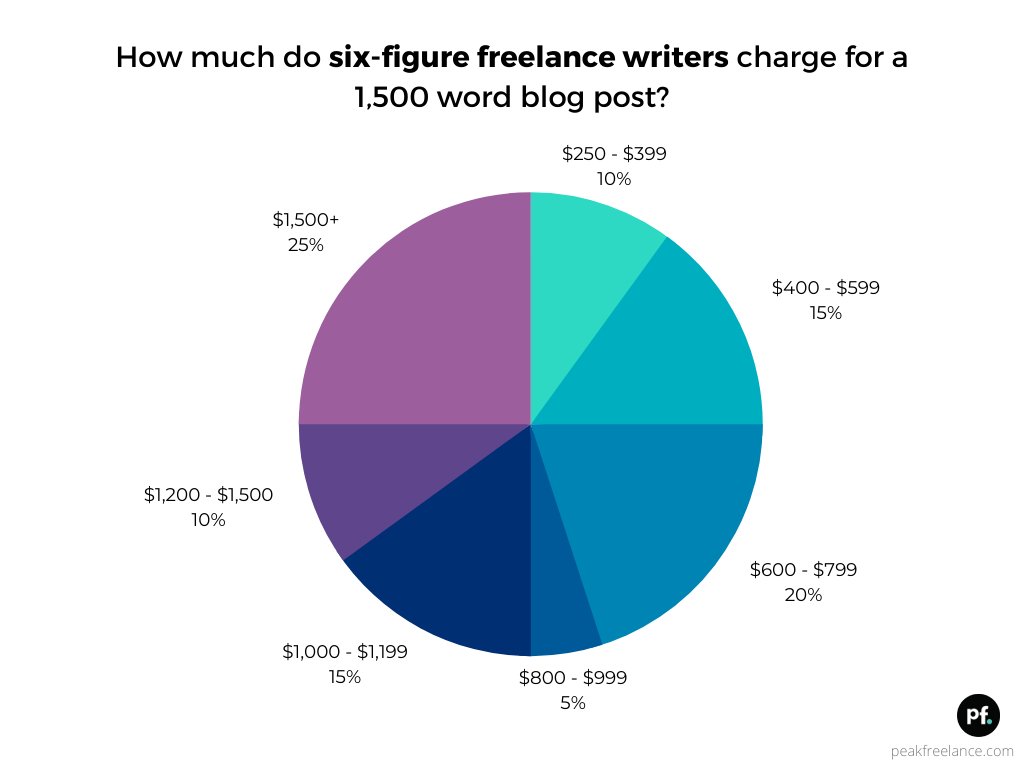
The average freelance writer charges $500-999 for a whitepaper
Whitepapers are longer than blog posts. Brands typically use them to attract leads, especially if the whitepaper is gated (hidden behind an email capture form).
Almost half of the writers in our survey offer whitepaper writing services to clients.
The most popular rate was between $500 and $999, with almost three in 10 respondents claiming that to be their whitepaper writing rate.
However, 55% charge more than $1,000 per whitepaper. Some 17% charged more than $3,000.
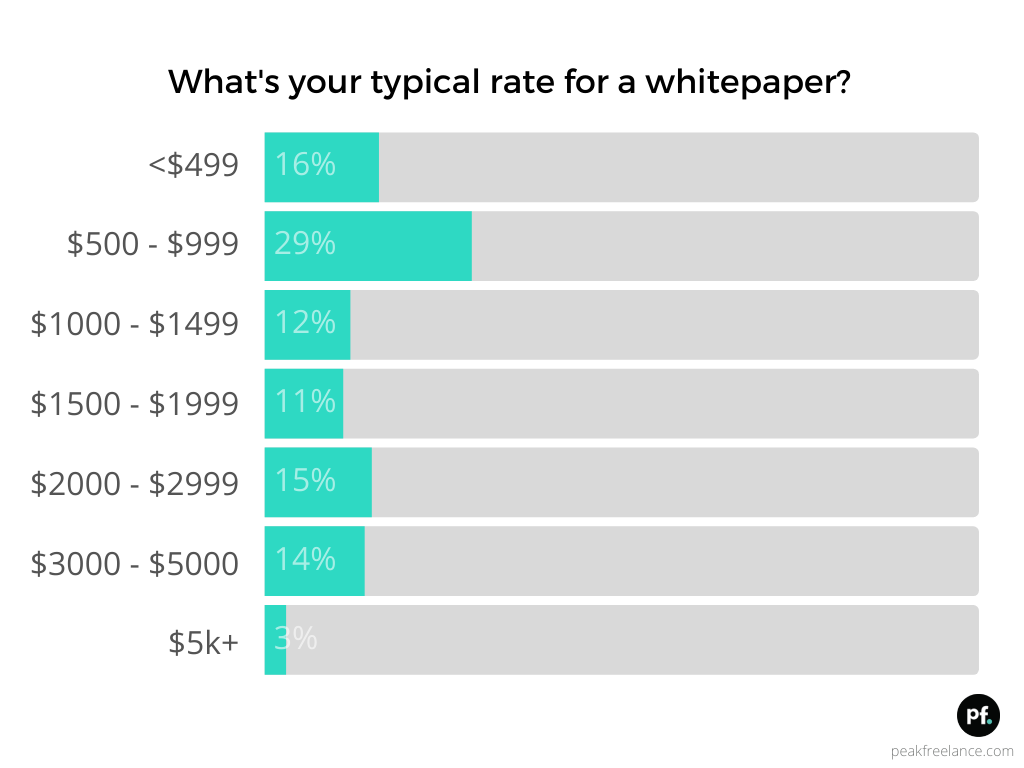
An interesting trend we noticed was that more experienced writers take on whitepaper assignments.
Some 60% of writers with six or more years under their belt take on whitepapers, compared to 44% of writers with less than that.

The average freelance writer charges $99-$249 for an email
Email writing is another popular service that freelancers offer. Half of surveyed writers produce this type of content for clients.
As the graph below shows, 39% charge less than $99 for an email, followed by 32% charging between $100 and $249.
For writers that don’t specialize in email copywriting, this seems to be a lower-priced service, with only 4% charging more than $600 per email.
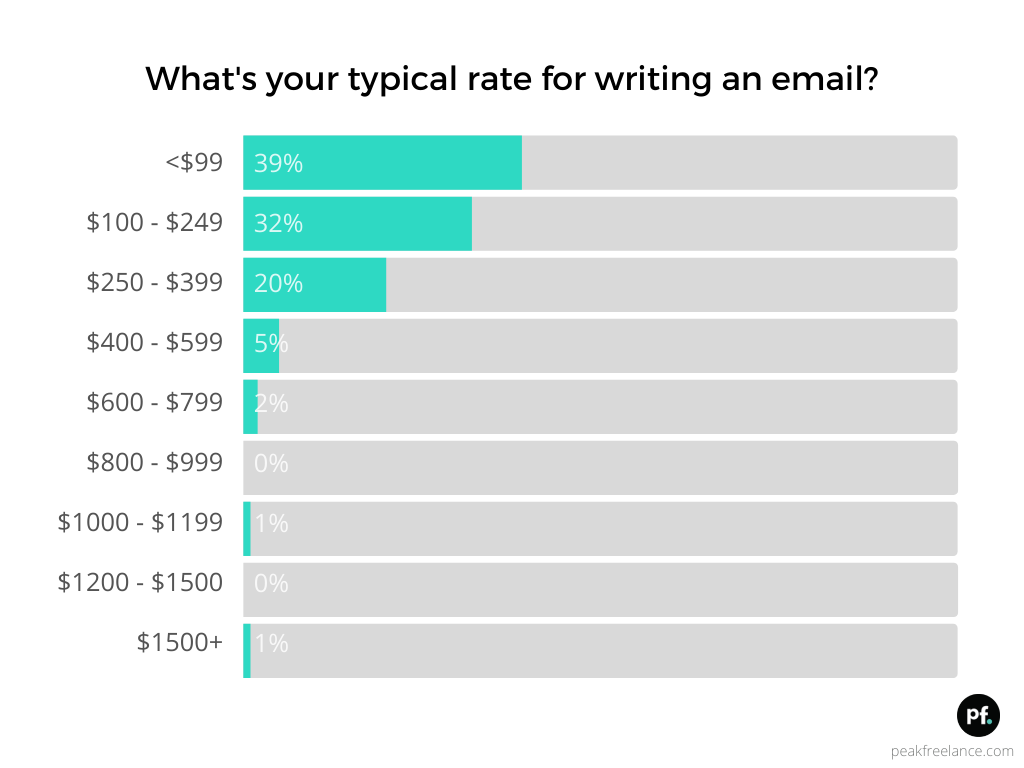
The average freelance writer charges 16-20% extra for ghostwriting
A freelance ghostwriter offers content writing services to clients. The only difference is their name isn’t attached to the piece when published.
Out of the freelance writers we surveyed, the majority (83%) take on ghostwriting work.
Interestingly, just 36% of those writers charge an additional fee if their name is scrapped from the published piece. Of those who do charge extra, almost half whack on at least a 16% premium to their ghostwriting project rate.
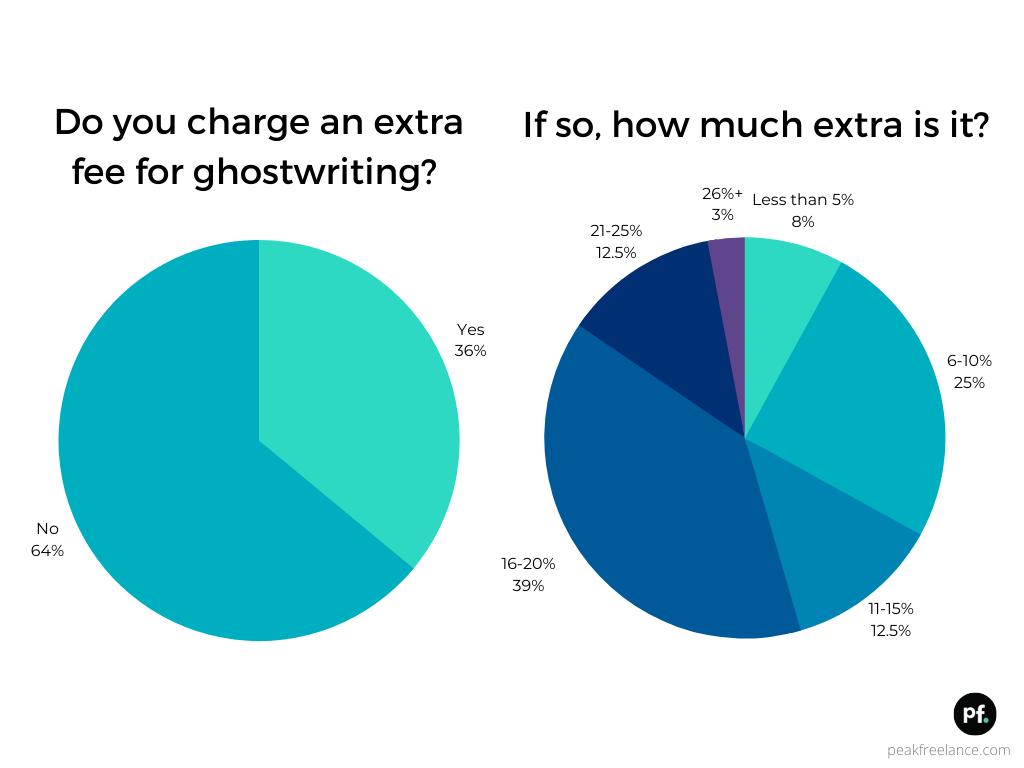
How to choose a pricing model
To set a freelance writing rate, you need a pricing model—the method you use to develop a figure for the client.
The most popular pricing model is a flat fee per project, with 63% opting for this method when pricing freelance projects. They give the client a figure based on the project scope, rather than the minor details (like word count or hours of their time).
However, per word rates comes in as second most popular. Around one in five writers prefer to charge per word; some 11% bill an hourly rate for time spent on the project. A very small number by revenue share (1%).
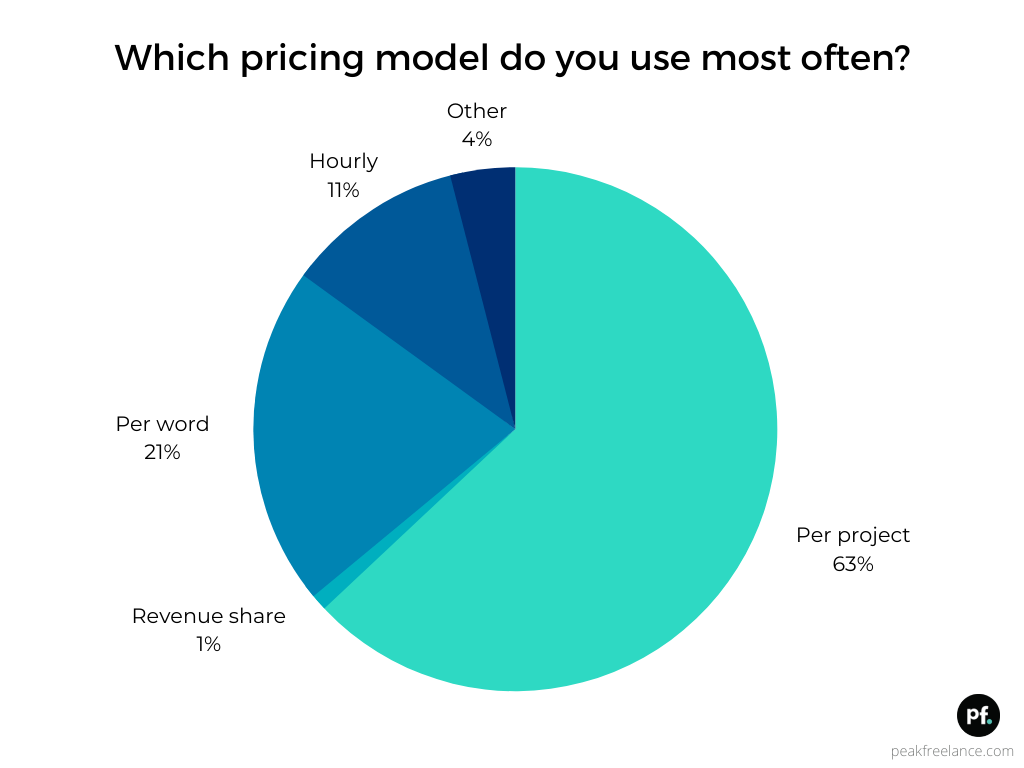
Charging a flat rate per project is the most popular option, no matter how many years of experience writers have—though 84% of those charging by the word are in their first year of business.
It suggests that many agree with this content writer who anonymously said:
“I started with per word pricing but as I gained experience I realized it didn’t truly reflect the work needed to create a high quality post. So I switched to per project rates.”
Wondering why per project pricing comes top? We received lots of comments about the benefits of pricing per project. This respondent sums up what many had to say:
“Per project factors in research , thinking time, writing, editing and procrastination. It’s easier to quote what you’re worth. With per-hour and per-word anything other than the actual writing of the words becomes harder to justify and/or is commonly queried by clients.”
Dealing with revisions and scope creep
Clients asking for revisions is a normal part of writing. It’s highly unlikely that you’ll nail things the first time around. Different clients have different expectations.
We asked our writers how many rounds of revisions they would typically include within their regular rate before charging extra.
Almost all writers (98%) include at least one round of revisions within their standard rate. It’s a fairly even split between those including one round (46%) and two rounds (44%). Some 8% will include three or more rounds within their standard fee.
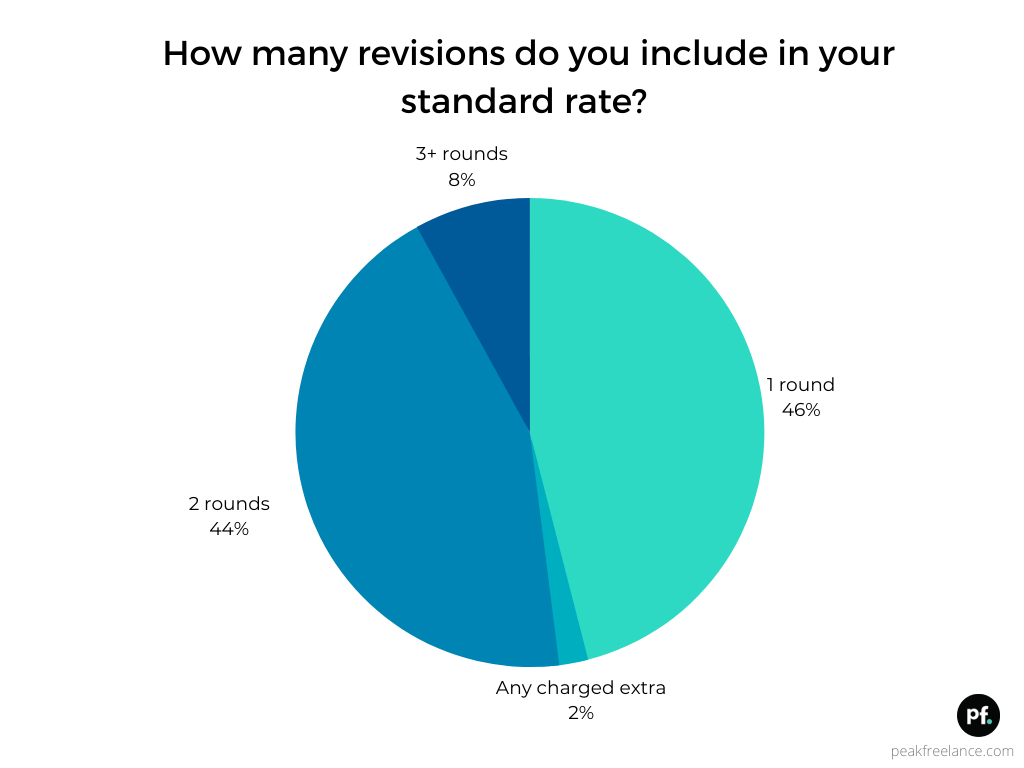
Revisions may be routine, but what do you do if you start work on a project and realize it is far more extensive than expected?
Responses from our writers varied widely on the topic of scope creep. When the situation happens, most writers (44%) would ask the client for an increase in the budget as soon as it becomes clear the work is more considerable. Some 8% would wait until they submitted a draft to ask for an increase.
Worryingly, almost a third would not say anything at all, and absorb the cost of scope creep—likely to avoid the awkward conversation with the client.
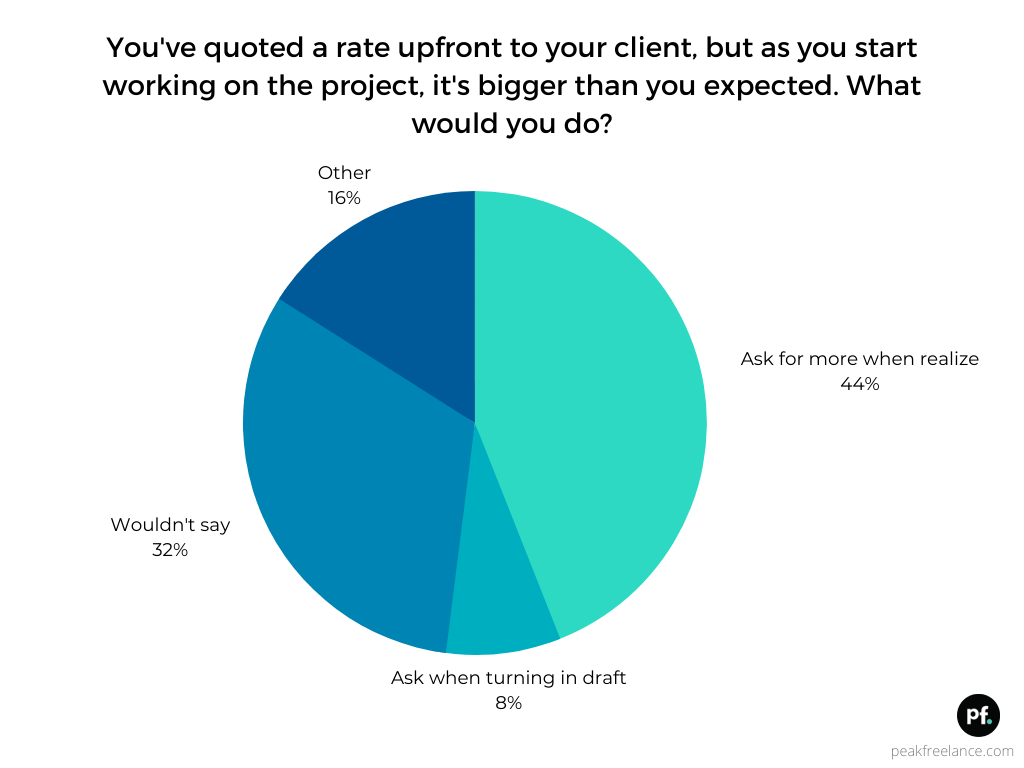
There were a lot of comments on this question. Most people tend to make decisions based on the specific circumstances.
Many felt that making an error with quoting would be their fault, so they should be the ones to absorb the costs. But if the project scope had changed, they would review the fee:
“If I’ve misjudged the scope of the project, that’s my fault and I work to the agreed rate. If, however, the client moves the goalposts or adds to the scope after we’ve agreed the fee, I tell them straight away and revise the fee.”
For a lot of freelancers, approaching the difficult conversation of scope creep depends on the relationship they have with the client:
“It all depends on the client. I request a change for long-term clients. For clients I work with sporadically, I tend not to ask for anything additional.”
While many wouldn’t ask for an increase on a current project, they would mention the issue so that clients were aware future projects would cost more.
“If it’s a one off project I’d absorb it at my loss. If there’s potential for an ongoing relationship I’d be honest and say I underquoted on this one, so they’re aware future jobs may cost more.”
Should I show my rates on my website?
Still unsure on whether to show your rates on your website? If you keep them hidden behind email, you’re in good company.
Around three quarters of freelance writers do not display rates on their website.
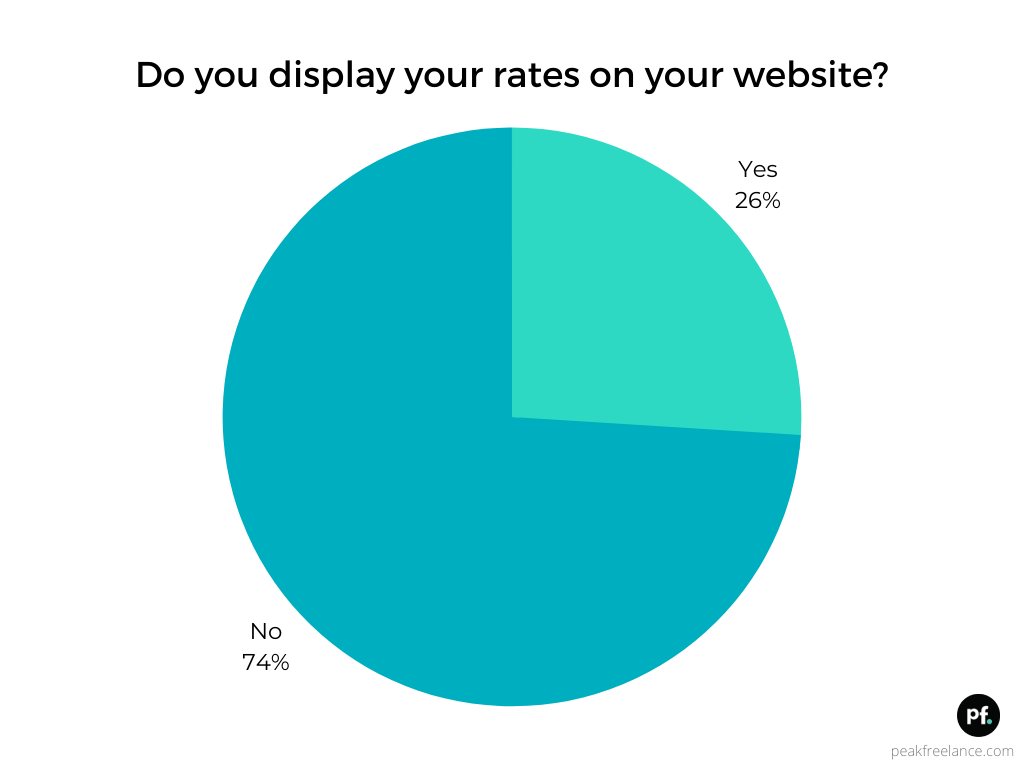
Comments on this topic suggest it is not a straightforward yes or no question. Quite a few writers don’t have a website at all. Many people don’t display detailed rates but do have a “starting from” rate to give potential clients an approximate idea of costs.
“Some clients have a smaller budget. I want to be flexible as much as I can, yet still stay within amounts I’m comfortable with. I know what the lowest rate I am willing to go is, so I want to hear what their budget is before I give a fixed rate. It has allowed me to work with clients and build my portfolio without worry of turning down clients.”
The most common reasons for not displaying rates? Flexibility and having rates that vary significantly between clients.
“I don’t want pricing to scare folks away in case I need to pick up business quickly, or it’s a company I really believe in and would be willing to do work for at a discount. I’d rather folks reach out so I can screen and potentially have the conversation.”
Of those that do display rates on their freelance writing website , the reasons include helping clients make an informed choice and weeding our time wasters.
“Ghosting has become a big problem. Lots of leads and enthusiastic intro calls, but silence as soon as I sent proposals. Publishing guide rates on my site has filtered out the low-end clients, so the ones I end up speaking to know my approximate cost and are more likely to convert.”
Where do freelancers find high-paying gigs?
This one is the million-dollar question, regardless of how long you’ve been freelancing for:
Where do people find lucrative high-paying freelance writing gigs ?
Our survey shows the most effective way to get jobs is through referrals and word-of-mouth, with 42% voting it as the channel that drives the highest-paying freelance gigs.
That’s followed by social media (17%), cold pitching (11%), communities (14%) and freelance writing job boards (6%).
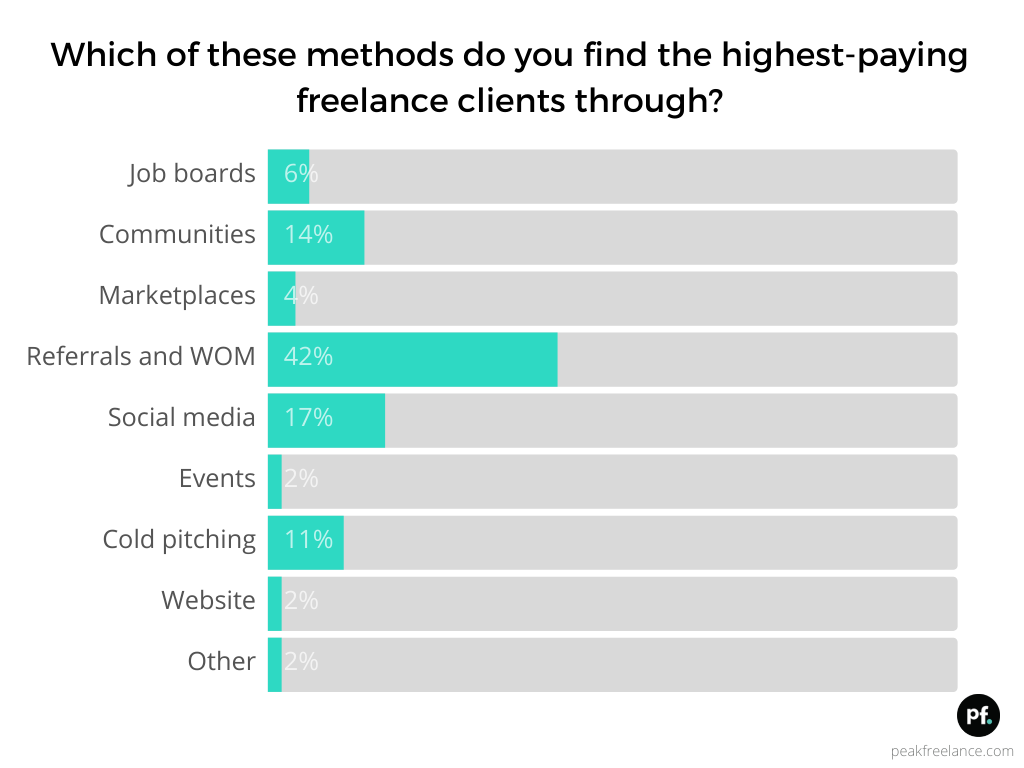
For writers earning six figures, the majority (85%) of their work comes through referrals and word of mouth, compared to just 64% of those earning under $30K finding work in this way. It is clear that making contacts and building relationships can have a huge impact on your career.
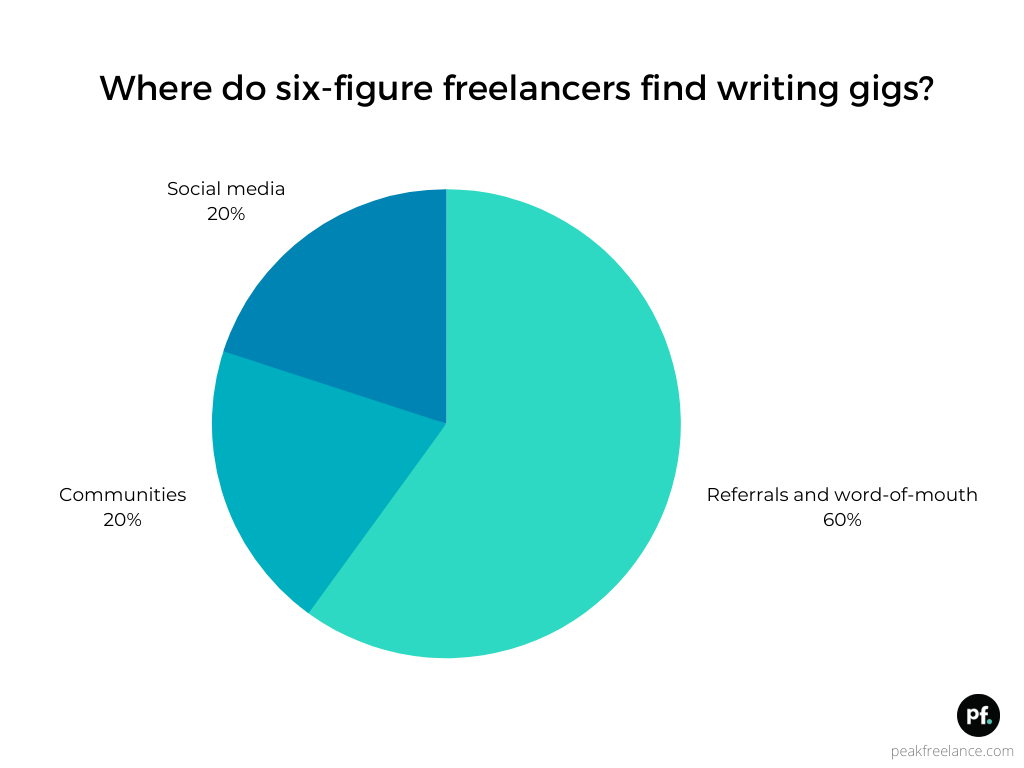
Do your freelance writer rates fall short?
Running this survey has given a fascinating snapshot into how and why writers set their rates as they do.
Charging per project is definitely the most popular pricing method across all levels of experience. It appears to be the method most people move to as they build experience and start increasing their rates.
If you’ve dove into the results of this survey and found your own freelance writing rate falls short, now’s the time to raise them.
Comments suggest people start off very cautiously with their pricing but gradually increase their rates as they gain experience and as they start to see the value they are bringing to clients.
“My first retainer gig with a content agency was $300/post. Using that as a baseline anytime I took on a new client I’ve added 10-20% to my rate, maybe a little more if it’s right in my niche.”
Either way, being upfront about your rates in advance of meeting clients appears to be surprisingly controversial. Many people value the flexibility of being able to vary their rates depending on the client.
There is a strong argument, though, to at least display a ballpark range or “starting from” figure to save wasting time on calls with clients that will never end up working with you.
Ready to scale your freelance writing business?
Peak Freelance is the support group we wish we had when building our freelance writing businesses to six-figures.
Become an All Access member and get access to:
- A private community to make friends and network.
- Expert interviews with content managers and successful freelancers like Kat Boogaard, Kaleigh Moore, and Joel Klettke.
- Monthly Zoom calls with other freelance writers.
- A members podcast sharing unGoogleable freelance writing tips for scaling a business.
- Pro courses, templates, and worksheets to make your business more efficient.
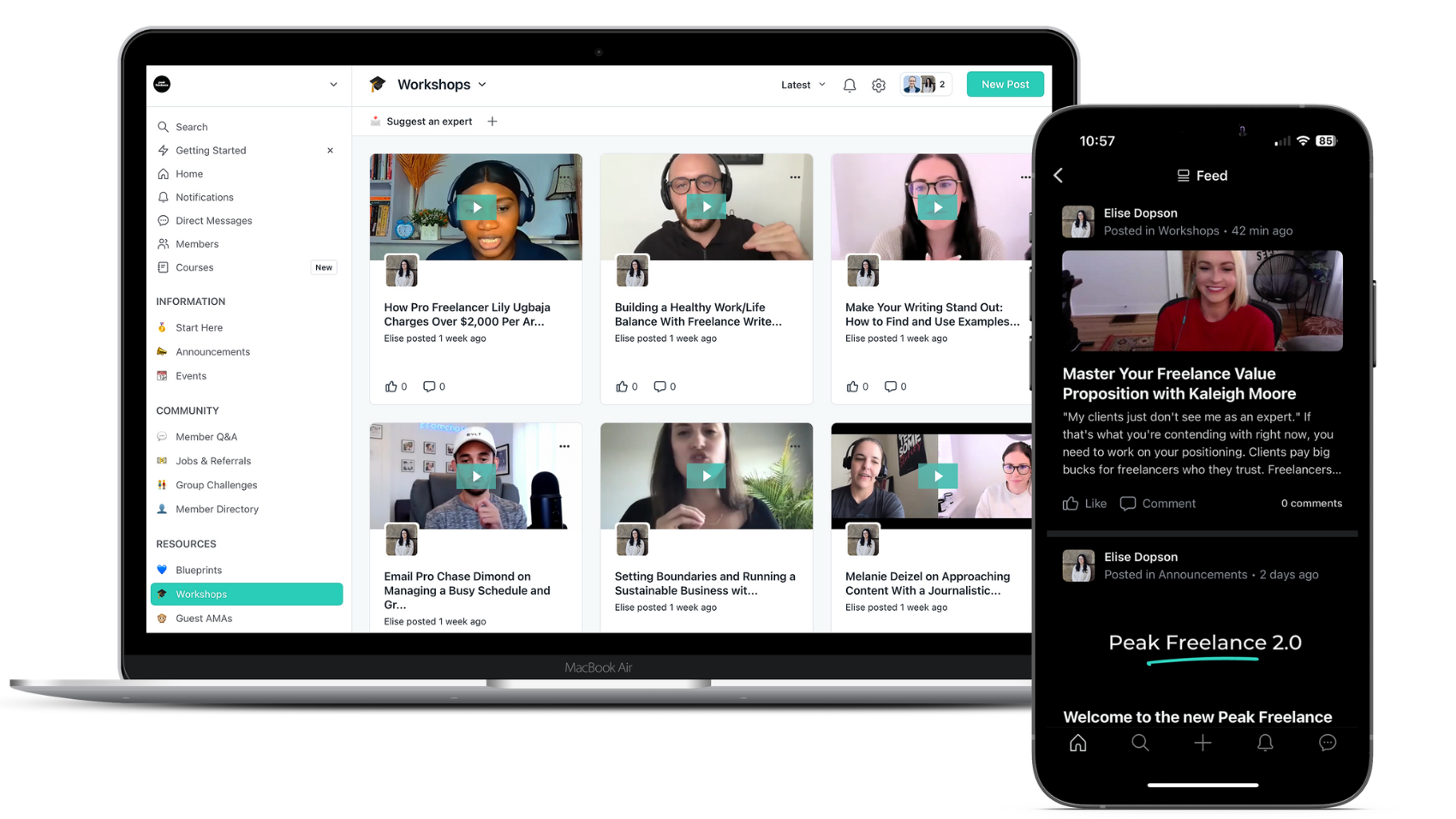
About Elise Dopson
Elise Dopson is a freelance writer leading B2B SaaS companies. She has bylines on sites like Shopify, Content Marketing Institute, and Business Insider. She's also the founder of Help a B2B writer, a service that connects B2B writers with top-quality sources.
More posts from Elise 👉
Reader Interactions
Leave a reply cancel reply.
Your email address will not be published. Required fields are marked *
Save my name, email, and website in this browser for the next time I comment.
Freelance community and resources ⚡️
Survey Results: How Much Should I Pay a Freelance Writer? [Infographic]
- Written By Allie Freeland
- Updated: November 9, 2023
At ClearVoice, we probably get asked this question more than any other: “How much should I pay for a freelance writer?” As creating content for marketing becomes more popular, everyone wants to know what the going freelance pay rates are for well-written blog posts, email newsletters, social media content, and ebooks.
On the flip side, we know freelancers are curious about how they stack up to others in terms of pay. Let’s face it, it’s a seldom-spoken topic. If you do a quick search on pay for freelance writers, you’ll see that many other publications begin to answer this question, but most fail to actually list any rates. That’s because the answer depends on many factors, but it’d still be nice to see some actual numbers.

How much should you pay a freelance writer for your marketing content?
This FAQ doesn’t have a simple answer. Most intermediate to advanced freelance writers charge between $0.10 and $1 per word, depending on the amount of work they will have to put into the project. But, the way they bill that average range will vary. Some freelance writers bill at a flat rate, per hour, or per monthly retainer for frequent work (in this case, a volume-based discount should apply), rather than per word. Typically, freelance writers who use one of those last three billing methods will include services beyond just the content.
In addition, rates change per industry, company, writer, location, and project ( and many other variables ), which is probably why this question often goes unanswered on the Interwebs. But, that’s not helpful for anyone.
Freelance writing rates explained
So we decided the best way to give you a useful answer on freelance writing rates was to ask freelance writers themselves what they charge:
Methodology of our freelance writer payment survey
We addressed a big question in content marketing: How much should you pay freelance writers? Or, if you are a freelance writer, how much should you charge? It’s kind of hard to know unless someone tells you, right?
The best way to get an answer to “how much to pay a freelance writer” was to take it to the streets. We polled 500+ freelance writers from around the country to see what they charge, how they charge, what type of content they produce, the corresponding level of experience, and even gender to see if a gap exists like in so many other industries.
Questions we asked in our survey on freelance writing rates:
1. how many years of experience do you have as a professional freelance writer.
- Beginner — 0–3 years’ experience
- Intermediate — 3–7 years’ experience
- Professional — 7–15 years’ experience
- Expert — 15+ years’ experience
2. How do you charge?
- Retainer/ project fee
- A mix — depends on the client
3. What do you charge per hour? (Approximate if N/A)
4. what do you charge per word (approximate if n/a).
- $0.11–$0.25
- $0.26–$0.50
- $0.51–$0.75
- $0.76–$1.00
- $1.00 and above
5. What tasks do you complete for clients?
- Blog posts/articles
- Email newsletters
- Social media content
- Print collateral
- Ebooks/white papers
- Research papers
- Other [Specify]
6. What is your gender?
- Prefer not to answer

Key findings around freelance writer pay, experience, and gender
After months of collecting data from freelancers near and far, we were able to see some pretty cool trends on freelancer pay rates. Some were expected and obvious. Others were a bit surprising.
There were several common themes:
1. You get what you pay for: Rates and level of experience are correlated.
When asked the question, “What do you charge per hour?” rates were cut pretty evenly, aside from the $1 to $20 range.
Here is the breakdown per hour and per word:
- $21–$40: 19%
- $41–$60: 18%
- $61–$80: 14%
- $81–$100: 19%
- $0.01 –$0.10: 14%
- $0.11–$0.25: 18%
- $0.26–$0.50: 18%
- $0.51–$0.75: 13%
- $0.76–$1.00: 25%
- 12% did not answer because they did not charge per word.
As we suspected, rates and level of experience are connected. Of the writers who charged the lowest rate, 25% were beginner freelancers, while only 1.5% of expert-level writers charged within that range. In fact, of the writers who charged the highest rate – $100+ per hour – most were experts (41%).
The findings were the same for per-word rates. Of the freelancers who charged between $0.01 and $0.10 per word, 32% were beginner writers, while only 0.8% were experts. And of the writers who charged more than a dollar per word, 54% were experts, while only 5% were beginners.
More on pay rates and quality
Interested in learning more about pay rates, experience, and quality? We previously reported on the correlation between pay rates and quality in our pay rate study for the travel industry and subsequent study for the tech industry . It was no surprise to find that writers with more experience, who charged more, were overwhelmingly better than more affordable, less experienced writers.
2. We found a gender pay gap in our sample that was the opposite of most industries.
Interestingly enough, we didn’t find the traditional gender pay gap in freelance writing, at least in our survey pool. Women, on average, charged more than men except in one category, which was at the intermediate level. When we scale-adjusted the pay ranges to the percentages within each group, it came out to…
Average of all pay levels:
- Women charged an average of 11.7% more per word.
- Women charged an average of 8.3% more per hour.
At the beginner level:
- Women charged an average 25.4% more per word and 37.8% more per hour than men.
At the intermediate level:
- Men charged an average of 5.4% more per word and 6.3% more per hour than women. *It was the only level where men charged more than women.*
At the professional level:
- Women charged an average 20.5% more per word and 11.1% more per hour than men.
At the expert level:
- Women charged an average 11.3% more per word and 5.7% more per hour than men.
Note: Only eight respondents in the survey selected “Prefer not to answer” on the gender question. In future studies, we will add a “non-binary” selection.
3. Most freelance writers are flexible in how they charge.
When asked the question “How do you charge?” freelancers overwhelmingly responded that “it’s a mix – it depends on the client.” In fact, nearly 60% of respondents vary their rates based on different clients, while 12% charge per hour, another 12% by word, and nearly 16% charge by retainer (or per project). This is good news for brands, as budgets and payment terms vary from business to business.
One data point that stuck out was that men were about twice as likely to charge per word than women.
4. No surprise, but articles and blogs are the most common type of content produced.
Overwhelmingly, blogs and articles are the most common type of content produced by freelance writers. In fact, 90% of respondents produce articles and blogs, a rate that was consistent across all experience levels. Here is a breakdown of all the content types in our survey:
- 90% produce blog posts and articles
- 52% produce email newsletters
- 56% produce social media content
- 30% produce “other” types of content
- 26% produce print collateral
- 25% produce ebooks and white papers
- 14% produce research papers
- 13% produce books
- 10% produce website copy
For the most part, men and women produced content types at about the same rate, with one exception: 41% of men reported producing ebooks and white papers while only 25% of women reported the same — the biggest gap for any content type.
5. Counter to popular opinion, older and more experienced freelancers were far more likely to do social media content.
While 80% of experts (those freelance writers with 15+ years of experience) reported doing social media content for clients, substantially fewer beginners, only 47%, reported the same. We found this point to be most surprising, as it counters the notion that social media is dominated by those who are younger. Perhaps putting your brand’s reputation in the hands of a freelancer requires the assurance they are more experienced?

Translating pay rates into the cost of content types
Although charging per word might not be the ultimate method of calculating pay with your freelancers, knowing the approximate word count for the content types you need can help you estimate initial cost figures to work from.
What type of content do you want to produce?
- Quality posts should be 800–2,200 words, depending on strategy
- Typically 5–150 words per post.
- Usually billed monthly or per project for bulk work.
- Intermediate to expert freelancers should include some strategy and research.
- Typically 100–800 words.
- Usually billed at a flat rate per email.
- Rate could be higher if research, media, distribution, or cross-publishing is required.
- Design is not included in the content rate.
- Typical ebooks range from 1,500–5,000+ words, while case studies often range from 300–900 words (usually translating into 1–3 pages for print collateral).
- Ebook writers are often more experienced freelancers (and quite possibly subject matter experts).
- Should always include research, sources, and media.
Parting Words
Sending a special thanks to the hundreds of freelance writers out there who took time out of their day to participate in this study. After viewing the study, we hope freelancers have a better pulse on what others charge. And same goes for brands! Now you should have a better idea of reasonable rates based on levels of experience.


Related articles to help you determine pay and hire quality freelancers:
- 5 Great Reasons to Hire Freelance Writers : Whether you don’t have the time yourself or your team is already overloaded, learn the big benefits of hiring freelance writers.
- The Power of Pay: Are Freelance Rates and Quality Correlated? [TRAVEL STUDY] : We assigned one travel article to seven writers and had 30 editorial pros rate the quality of the submissions. Did vetted experts outperform less experienced writers?
- Survey Results: Factors in Determining Freelance Rates for Different Assignments : Different assignments, different rates, but same freelancer. Do really value and understand your freelancers’ time? If you need more editorial insight on gauging the work that goes into assignments, Jenna Rose Robbins captures many points marketers and newbie publishers need to know from the freelancer’s perspective.
- 15 Scenarios When You Should Pay Freelance Writers More : Developing a solid working relationship with freelancers is no less important than fostering respect with your fellow FTEs. Educate yourself on the most common contingencies and special circumstances that warrant you paying a freelancer above and beyond their normal rate.
And related articles for freelance writers trying to boost their income:
- How to Make $100k or More as a Freelance Writer: Successful Women Share Their Advice : Get ready to make more than ever before after hearing how these freelancers hit the $100k mark—and beyond.
- How to Address Clients When Rates Are Higher Than They Expect : Hear directly from successful freelancers on how they proved their worth to clients and got the rates they deserve.
- How to Grow Your Freelance Writing Rates (and When It’s Time to Ask for More) : When you become your own boss: How do you know when you’re due for more money? Learn when to ask clients for more.
Looking to outsource your content? Connect with a content strategist today and discuss your content needs, goals, and budget.
Stay in the know.
We will keep you up-to-date with all the content marketing news and resources. You will be a content expert in no time. Sign up for our free newsletter.

How to Measure Success in Content Distribution: Essential Metrics and KPIs

The Ultimate Spring Cleaning Checklist for Your Freelance Business

The Art of Freelance Pricing: How to Value Your Work and Elevate Your Income
- Content Production
- Build Your SEO
- Amplify Your Content
- For Agencies
Why ClearVoice
- Talent Network
- How It Works
- Freelance For Us
- Statement on AI
- Talk to a Specialist
Get Insights In Your Inbox
- Privacy Policy
- Terms of Service
- Intellectual Property Claims
- Data Collection Preferences

Content Writing Prices (How To Set Your Hourly Rate)

As a beginner content writer, it can be hard to know how to set your hourly rate. Content writing prices vary a lot, and there are a few key factors to consider when setting yours.
Like any industry, content writing rates vary and depend on a writer’s experience, reputation, and the quality of their work. There are also different ways to charge for writing services instead of by the hour, including charging per word, per project, or on a retainer basis.
In this article, I look at how to set your content writing rates by the hour and the important factors to account for. I’ll also discuss setting your content writing rates in other ways, and the factors to consider when doing so. But first, let’s take a look at some average content writing hourly rates.
Table of Contents
Average Content Writer Hourly Rates
The average content writing hourly rate varies depending on the niche and the experience level of the writer . However, you can expect to earn anywhere from $15 to $40 per hour as a beginner, and this can increase to $50-100 per hour for more experienced content writers with greater expertise.
Looking to enter the world of freelance content writing? Check out our article full of tips for beginners .
Arguably the most important factor that’ll affect your content writing hourly rate is your niche. Below is a table of some of the average hourly rates of different niches, to give you an idea of the kind of money you can make as a freelance content writer.
Content Writing Rates By Niche
These are estimates based on the niches, and clearly you will be able to find jobs in each niche outside of these ranges. Clients may not offer an hourly rate in these niches and instead charge per project, meaning your hourly rate is affected by the rate at which you complete the work (more on that later).
The higher paying niches tend to be the more technical ones, or those that require more authoritative expertise (such as finance or medicine). Depending on your level of expertise, you can charge rates well above these estimates.
Average Content Writing Hourly Rate In The UK
According to Payscale , the average hourly rate for a freelance content writer in the UK is about £15 per hour. At the upper end of the range, freelance writers can earn as much as £30 per hour. The lowest rate is around £10 per hour.
However, it’s key to note that the numbers vary a lot depending on who you ask. However, Talent.com suggests a similar average to Payscale of £15 per hour.
Like any job, you can expect to start at the lower end of the scale and work your way up from there in terms of rates. As you can see, there’s a lot of potential for growth and the higher rates are a good incentive to master content writing skills quickly!

Average Content Writing Hourly Rate In The USA
According to Payscale once again, the average rate for content writers in the US is about $25 per hour. Like the UK, there’s a wide range of hourly rates that freelance content writers can expect to earn in the US. The lowest 10% earn around $15 per hour and the top 10% make upwards of $50 per hour.
How To Set Your Content Writing Hourly Rate
There’s an easy way to work out your hourly rate as a content writer. First, you need to identify your target annual income. This needs to factor in your regular outgoings, such as rent, food, utilities, taxes, and business expenses , as well as a profit margin.
Once you know your target annual income, you can work backwards to calculate your ideal hourly rate.
A Simple Formula
Let’s assume you’ve decided to work on content writing for 20 hours per week, 50 weeks of the year. You’ve also worked out that you need to earn $20,000 per year to make ends meet and turn a small profit.
To calculate your hourly rate, simply divide your target annual income by the number of weeks of the year you’ll work. Then, divide this figure by the number of hours you want to work per week.
So, in our example, this would be ($20,000 ÷ 50) ÷ 20 = $20 per hour.
However, this is a major simplification. It doesn’t account for extra hours worked and unexpected time off. It also doesn’t take into account whether you’re actually worth the hourly rate you calculate. But it does serve as a good starting point if you have no clue what to charge.
Don’t Forget Unpaid Hours
When calculating your hourly rate, you also need to factor in the unpaid work you do to run your business. This includes time spent on invoicing, marketing your services, managing your website, and other general overheads. You’ll probably find this adds up to around 10-30% of your total working time. So, it’s important to account for this in your rates!
Let’s now revise our above calculation to take unpaid hours into account. We do this by adding between 10-30% of the hourly rate we calculated. So, the hourly rate of $20 increases to between $22-$26 per hour to account for unpaid hours.
Okay, that’s the easy way to set your content writing hourly rate. But there’s more to it than that if you want to find success!
5 Things To Consider When Setting Content Writing Prices
1. your experience level.
The first and most important factor to bear in mind when setting your prices as a freelancer in any niche is your experience level. The same applies to any job really, as the more experienced you are, the more you tend to get paid. While you might have this decided for you in a 9-5 job, it’s on you as a freelance content writer to decide what you’re worth.
If you’ve been writing for 5 years, you’re likely able to charge much higher rates than someone that has only been writing for 5 months. And if you’ve got 20 years of experience in the niche, you can likely charge more than someone that’s been doing it for 3 years. However, it’s not just about how long you’ve been writing in the space.
Your Writing Experience
It goes without saying that you’re probably a decent writer if you plan to become a freelance content writer. So, assuming you have the basic writing skills down, it’s worth remembering that “experience in the niche” doesn’t necessarily mean experience writing in that niche.
For example, perhaps you spent 5 years working for a digital marketing agency. This probably provided you with some decent writing skills. But it’s also valuable experience that gives you knowledge about the industry that someone who has been writing (but not working) in the digital marketing space for the same length of time may not have. Hands on experience is often worth more than hands off experience.
The same applies for any other niche.
Worked on a farm for a few years? Agricultural content writing could use that experience!
Have a biology degree? There are blogs and businesses out there in need of that knowledge.
The more experience you gain, the more knowledge you tend to build up that other people don’t have. Clients will often pay a premium for this, making experience level a key factor to consider when choosing your content writing rates.
2. The Work You’re Doing
Next up, consider the nature of the work you’re doing.
- Is it long-form content that requires 3 hours of research per 1000 words?
- Is it a batch of short blog posts for a business’ website?
- Are you producing technical pieces that require very specific expertise?
You need to factor in how long it takes you to complete the work from start to finish. Don’t just include the writing time, as you’ll likely spend a big chunk of your time researching and planning the content. You’ll also be applying your expertise, with regard to knowing what to research and how to properly plan and lay out the content. All of this is worth charging your clients for, as they will know it’s not just the words on the page that they’re paying for.
Also consider what this work is for.
- Are they using it for a product landing page on a website?
- Are they using it for other forms of marketing?
- Is it informational content that will hopefully help them rank in the search results?
It’s likely that the content you’re writing is designed to earn the client money in some way, which they’ll see as a return on their investment.
If the 500-word piece of content is likely to generate them thousands of dollars in sales over time, it makes sense that you should charge more than $20 for it. But if it’s content that’s going on their personal blog’s About Us page, which is unlikely to be seen by too many people or directly convert any readers into customers, you probably won’t be able to charge $500 for it.
Clearly, there are a lot of nuances to consider here. Alongside what the writing is for, the type of writing is also important when deciding on your hourly rate.
3. The Type Of Content Writing You’re Doing
The type of content writing you do will also affect the rates you can charge. Let’s discuss why that’s the case with a few specific examples.
General Content Writing
General online web content writing (SEO writing, blogs, and “content mill” work) tends to pay lower per hour (or per word) than other types of writing. Despite the lower rates of pay, these are excellent ways to get your foot in the door of the writing industry. They allow you to develop relationships with clients and build up a portfolio of work.
In saying that, some experienced writers earn astronomical salaries in these categories. But this is the exception rather than the norm, so you should expect lower hourly rates for this kind of content writing.
Copywriting
Copywriting is one of the higher-paid content writing jobs . This includes writing for marketing purposes, press releases, and sales pages. Copywriters can change higher rates because the impact of their writing can be measured in terms of increased traffic, conversions, and sales. The more value you can generate for your clients, the higher the rates you can charge.
Technical Writing
Highly technical forms of writing also pay significantly more per hour than other types of content writing. This includes technical white papers, business-to-business (B2B) content, and industry-specific documents. This is because they require specific knowledge of scientific, medical, engineering, or other specialized topics. Clearly this is only an accessible path for those with certain expertise.
Ghostwriting
Finally, ghostwriting books or other content is something of a lottery. While some writers earn huge salaries, others struggle to make ends meet. The hourly rates ghostwriters charge usually depend on the potential returns their work generates for their clients. Established authors will pay more, while those looking to break into the market won’t have as much to spend on a ghostwriter.
4. Who The Client Is
If you’re marketing your services to high-ticket clients, such as big businesses with a lot of money to spend, you can demand higher prices than if you market them towards small business owners. The difference in these price ranges could be an order of magnitude, so it’s key to understand who your clients are before you set your prices too high or too low.
If you offer writing services for small blogs, it’s unlikely that the blog owner has much spare cash or the blog traffic to justify spending hundreds of dollars on 500 words of content.
But if you plan to market yourself towards big brands or websites that see hundreds of thousands of visitors per month, you might be able to charge these kinds of prices. Getting access to these clients usually takes time or a strong network of connections – don’t expect to be charging dollars per word or $50 per hour as a total beginner!
5. Extra Services You Can Offer
This factor will vary in importance depending on what your main service is. But if you can offer anything above and beyond for the client, you can usually raise your prices accordingly. The best way to explain this is with a few examples.
Blog Post Extras
Let’s say you offer blog post content writing. If you can source images – be it stock imagery or your own photography – you might be able to charge extra by offering to include them in the content. This can save the client time as they don’t need to find their own images, and if you can put together bespoke photos or graphics for a post, they’ll usually expect to pay extra for it.
Another extra service could be search engine optimization (SEO), although many clients may expect this as standard. Perhaps you also offer internal linking within your content, meaning you’ll find some of the client’s relevant content to include – although many clients will provide you with links to include from the start.
The extras you offer will depend on the nature of your work and who your clients are, illustrating once more that all of these factors are intertwined. Now let’s talk about charging per word as a content writer.
Content Writing Prices Per Word
Content writing prices can vary from a few pennies per word to $1 or more, and it largely depends on the nature of the project and the experience level of the freelancer. The more experience and specific expertise the content requires, the higher the rate per word, as with hourly rates.
Beginner content writers will find projects on job boards advertising rates as low as $0.02 per word, and around $0.12 is usually the limit for these (typically) entry-level jobs.
On Fiverr, you’ll find freelance content writers offering 1,000 words of content for anywhere from $10 to $300 or more, or $0.01-$0.30+ per word. Other content writing clients may pay even more than this if you source them elsewhere.
What Is A Good Content Writing Hourly Rate?
The rate you charge largely depends on the nature of the work. If you’re a total beginner but you have solid writing skills, a good starting rate per word is something like $0.05 to $0.10 per word. However, you can definitely command more than this for the right clients, and $0.20 per word isn’t unachievable if you have a lot to offer other than generic writing.
But even $0.02 isn’t a bad rate if you find the work enjoyable and you can write enough fast enough to make a decent living. For example, if you can write (and edit etc.) 1500 words per hour at this rate, it translates to $30 per hour – not bad by any means.
But if the project requires half an hour of research and another half an hour of image or graphic creation, your hourly rate is cut in half to $15, which may not be enough for you.
Obviously, the better you are at writing and the more value you can offer your clients, the higher the rates you can charge. If you have expertise and proven writing skills, you can certainly earn 50 cents or even a dollar per word at the very top level.
How Much Should You Charge For 500 Words?
How much you should charge for 500 words as a content writer will vary depending on your niche, the service you offer, and the client . But if you’re an absolute beginner, expect about $0.05-$0.10 per word, making about $25-$50 for 500 words. If you’re more experienced, you might earn $100-$200.
500 word articles likely fall into one of two categories of content: short blog posts or short pieces of marketing content.
In the case of short form blog articles, the return on investment for the client is likely quite low. They can monetize the content with ads and affiliate links perhaps, but it’s not likely to be a massive revenue generator. You need to remember that as the writer, and so you might only be able to charge less than 20 cents per word (often less than 5 cents for beginners and for very simple blog posts).
But a 500 word piece of marketing content could serve as a business’ landing page for a specific product. You might be applying your own marketing expertise and insights and it may take you several hours to perfect it. The business is also likely to generate decent revenue from that marketing material, which allows them to pay more for it knowing they’ll get a faster return on investment than with a blog post. This means you may be able to charge closer to 20 cents or more for 500 words.
How Much Should You Charge For A 2000 Word Article?
2000 words is more likely to be a long form article, unless it’s 2000 words of smaller posts charged in one go. For the sake of this section, I’ll assume it’s a 2000 word blog post or other piece of website content. For this, you’re likely only going to be charging on the lower end of the scale. You won’t find many clients willing to pay more than $0.15 for this kind of post unless it’s heavy on the expertise requirements.
You could also be writing 2000 words of marketing material or some other content that is designed to convert readers into customers. In this case, you can usually charge anywhere from $200 to $2,000 if you’re an expert in the field.
How Much Should You Charge For A 5000 Word Article?
For 5000 word posts, it’s vital that you consider how long it’s going to take you to plan, research, write, and edit the content when you’re setting your rates, not just the number of words. This length of article may require hours either side of the writing process to add enough value for the client, so make sure to factor that in to the rates you charge.
Charging Per Hour vs Per Word
Choose your content writing hourly rates carefully.
As a content writer, it’s essential to set an hourly rate that’s not just competitive but also sustainable in the long term. Always keep an eye on your competition to make sure you’re not overcharging or offering your services well below the going market rates for similar services.
When first starting out as a content writer, you might need to set a lower hourly rate until you start to build up your portfolio , credibility, and authority. But over time, there will be plenty of opportunities to grow your client base and increase your rates.
You may decide to avoid charging an hourly rate altogether. Instead, you might offer your services on a per-word basis. Or you might charge a project fee. Hourly rates aren’t for everyone, so don’t neglect these possibilities for your content writing business.
Setting the right rates is just one aspect of building a successful content writing career, and there are lots of other key content writing dos and don’ts to be aware of.

Chris is the creator of Freelance Ready. He originally started freelancing (on Fiverr) while at university, writing and editing website content. He created this website to share his freelancing experience and help others on their own self-employed journeys. He is now a freelance SEO consultant and content editor. You can learn more about Chris here .
Freelance Ready is reader-supported. That means some links on this website are affiliate links. If you sign up or make a purchase through these links, we may earn a commission.

Carmine Mastropierro
Freelance writing rates – benchmarks, averages, and data.

I hope you enjoy my blog post. If you need copywriting coaching and a community, join my academy .
Join The Newsletter!
Get my latest content on business, marketing, and copywriting.
Trying to figure out how much to pay a freelance writer or charge yourself?
No problem.
I’ve been freelance writing for over eight years, and I’ve also outsourced writing to various employees during my time as an entrepreneur.
Today you’re going to learn benchmark rates for different areas like content writing , direct response copywriting, technical writing, and more.
Remember that rates differ based on industry, the writer’s portfolio and skill level, and your budget, among many other factors.
With that being said, let’s get into it!
Freelance copywriter rates
These are the rates that you should expect to charge as a copywriter or pay if you are outsourcing projects.
What is copywriting?
Copywriting is the practice of producing sales copy , which helps a business increase revenue, leads, or another important KPI.
In this instance, I’m particularly speaking about direct response copywriting .
This includes writing sales copy like:
- Sales letters
- Landing pages
- Video sales letters
- Product descriptions
- Advertisements
These pieces of material are as close to the point of sale as possible, which is why direct response copywriters get paid the most out of any field of freelance writing.
Their skill can easily generate a client incredible amounts of revenue, and it’s easy to measure.
If you were to pay a writer $10,000 for a copywriting project and they netted you $100,000 in sales, that’s a great ROI 🙂
Copywriting rates
Copywriting is typically billed on a per-project basis or by the hour.
PayScale has found that the average beginner freelance writer earns approximately $40/hour CAD.
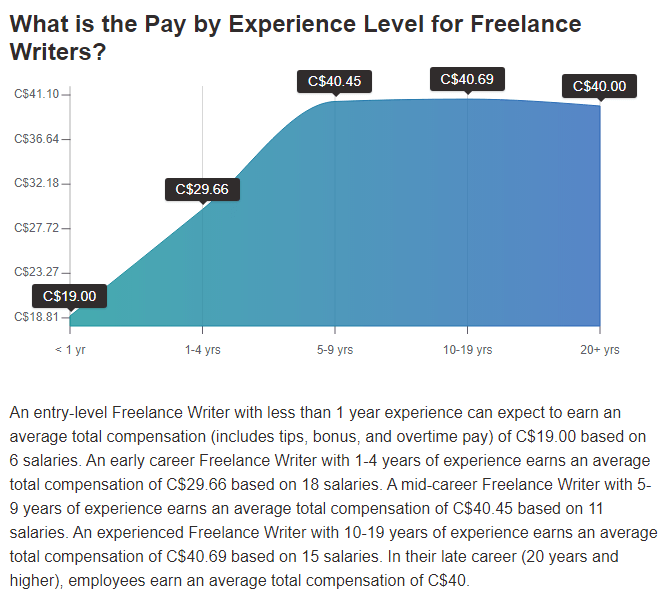
Not bad, right? Well, it gets better…
According to the Professional Writers Association of Canada, advertising material is normally billed at $75-150/hour .
Copywriters also commonly charges a day rate , which is their hourly rate multiplied by eight, as that’s a full working day .
In the case of a copywriter that charges $75/hour, her day rate would be $600.
If a project were to take two weeks, the total cost for you would be $8,400.
This might seem a lot for some business owners, but remember that it’s an investment.
A good copywriter doesn’t write material for fun. They write it to produce results .
Per-project rates are based on the estimated amount of hours that a project will need to be completed multiplied by the copywriter’s rate.
Some writers may charge a small royalty fee, as well. This could be anywhere from 1-10% of revenue or more.
If you need help growing a copywriting business, check out my training which includes mentorship.
Freelance editing rates
Don’t underestimate the power of editing.
Copy and content often go through ruthless edits to make them completely polished and clean.
Editors specialize in fixing grammar mistakes, and spelling errors and rewriting copy to make it flow better.
Sometimes you have great material, but it lacks clear communication. An editor will revamp it so that it better resonates with customers and ultimately increases conversion rates.
According to PWAC, editors typically charge $30-60/hour or $500-20,000 per project.
Freelance proofreading rates
It’s easy to get editing and proofreading confused. They are often performed together but can be done as separate services.
Proofreading comes after the editing process and involves re-reading the copy to correct inconsistencies.
While the editor actually makes the changes, the proofreader helps offer advice for communicating your message in a better way.
Hiring a proofreader will improve your branding and how well you sell a product. They will study your business and ideal customer down to a science, helping writers and editors as a team with their knowledge.
The amount you pay for a proofreader to complete a project will depend on many factors, such as:
- The material : The complexity and type of content that needs to be proofread will change the project’s price. Something like a business plan or scholarly article would be more expensive than a blog post, for example.
- Length : The longer the material, the more you will pay. This is purely based on scale, as it will take the proofreader more time.
- Qualifications: If the proofreader has an impressive portfolio and a history of results for previous clients, expect to pay a premium, as you will get a better ROI.
Generally, you can expect to pay $15-45/hour for proofreading services on average.
Some professional proofreaders will charge upwards of $100/hour, however.
Website copywriting rates
Website copywriting is the process of creating websites that accurately display a brand’s message while improving how many customers they acquire.
Copywriters will create home pages, about pages, contact pages, service pages, and other key areas of a website for their clients.
They use strategies such as storytelling, calls to action, elaborating on product benefits, and more to increase the client’s sales.
Website writing is typically billed between $1-3/word or $60-100/hour.
Learn more about my website copywriting services if you need high-converting web pages.
Some writers will bill based on the number of pages you need as well. For example, they might charge $400/page. A five-page website would cost $2,000 in that case.
Freelance journalist rates
Journalism is one of the best money-making niches as a writer .
Writing in magazines tends to have some of the highest rates available, ranging from $0.50-3/word.
If a writer were to produce a 1,000 word article at $3/word, that’s $3,000!
Typically journalism is billed on a per-word or per-article basis since it’s more of an ad-hoc industry.
You don’t see many retainers being offered in journalism, although they can be done.
Read my list of magazines looking for freelancers to learn more.
Freelance technical writing rates
Interested in offering freelance technical writing services to clients? Here’s what you need to know:
What is technical writing?
Technical writing is writing content that is technical in nature, such as reports, instructions, booklets, and similar material.
It requires the writer to be skilled in writing to a very specific audience while clearly laying out steps for using or achieving something.
They will also have savvy research skills, commonly conducting interviews, collecting resources like market reports, and ultimately becoming an expert on the given topic.
Average technical writing rates include:
- $300-12,000/project
- $50-125/hour
ClearVoice performed a study on technical writing rates and found that experts are at $0.75/word.
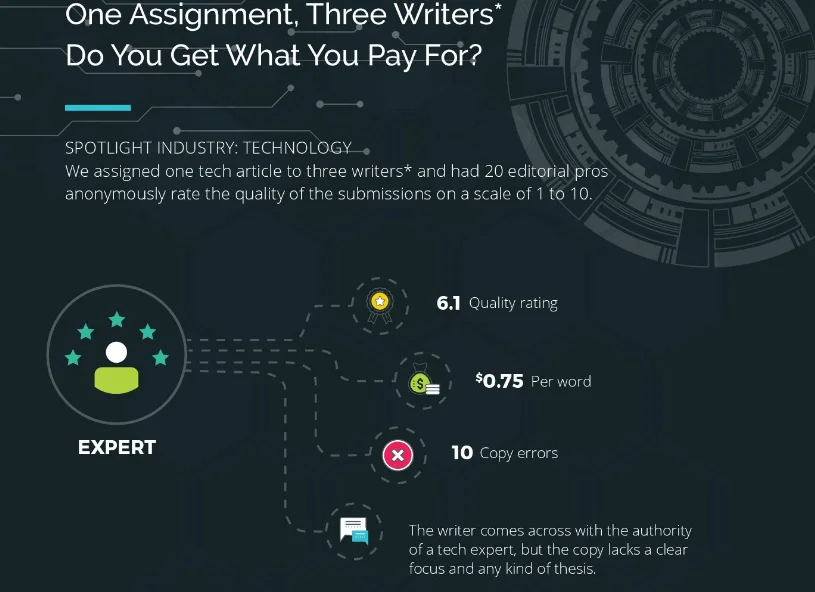
Note that the copy usually some up to 10 errors and lacks a clear focus or thesis. This is why editing and proofreading are so important!
Freelance content writer rates
My bread and butter.
I love producing SEO content for my clients because it improves their authority, organic traffic, and helps them naturally acquire customers without lifting a finger.
Freelance content writing is the practice of creating blog posts, whitepapers, case studies , and other website content for businesses.
It is regularly billed on a per-word basis, and I’m a firm believer you should not pay or charge any less than $0.10/word.
Data has found that the average content writer gets paid $500+ for a 1,000–2,000 word blog post.
If you’re wondering, “How much charge do I charge for a 1,000 word article?” here’s your answer. 🙂
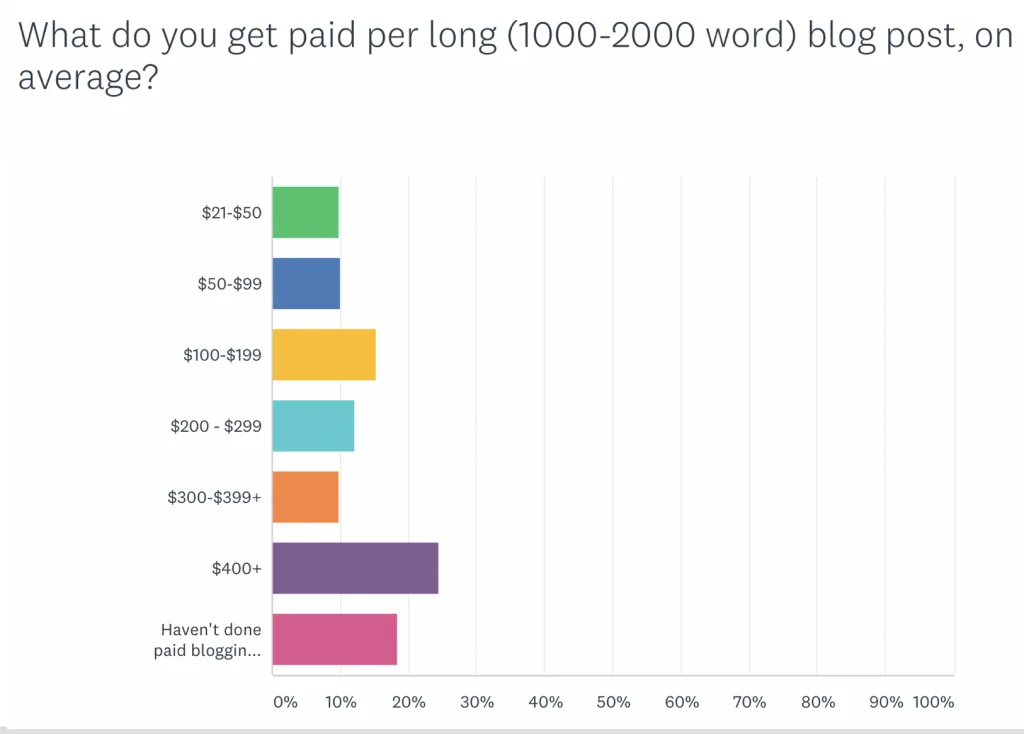
Similarly, how much should you charge for a 500 word article?
The same study discovered that content writers get paid $300–500 for short blog posts.
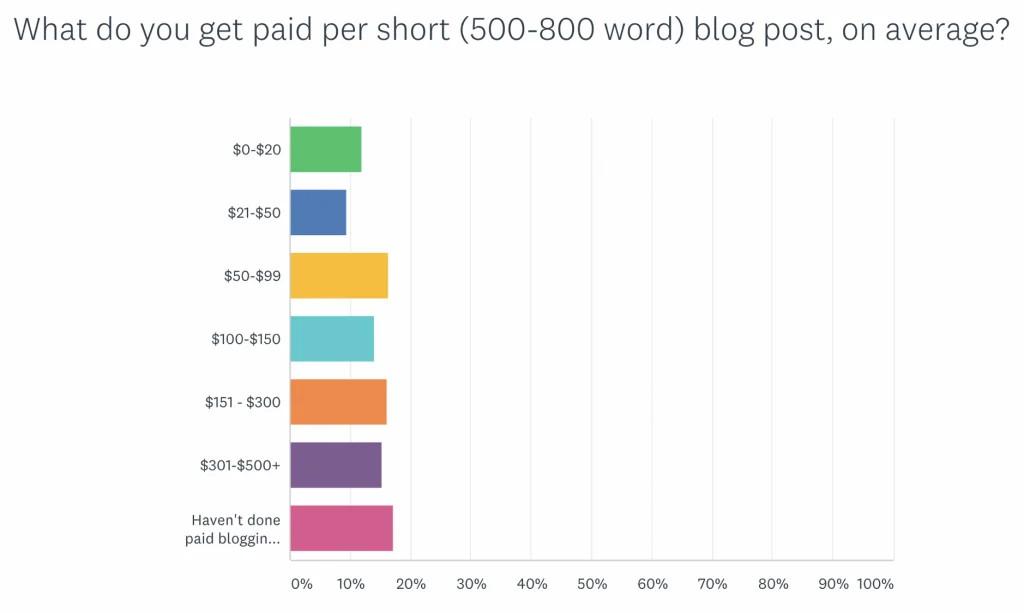
Remember that how much you pay will determine the quality of the writer you get, and ultimately the improvement in business performance.
A copywriter skilled in SEO , lead generation, and CRO will charge more because they can create more results for your company.
Some content writers like myself offer packages and retainers. This bundles up a variety of services, features, and benefits for my clients.
It also makes my income and revenue more predictable.
Enroll in my SEO copywriting course to take your search engine marketing skills to the next level.
Different copywriting rate structures
There are no one-size fits with deciding how much to charge for copywriting.
Every writer, client, and project is different.
Here are the most common ways to bill for copywriting and when each approach is appropriate:
Charging an hourly rate is one of the most common approaches to billing for copywriting.
I do it all of the time.
This is ideal when there may not be a set amount of deliverables, or the project is very flexible.
I recommend that you use a tool like Clockify to log how many hours you or a freelancer works.
This makes billing much more accurate and fair.
Visit Clockify’s website and register for an account by clicking “Go to tracker.”
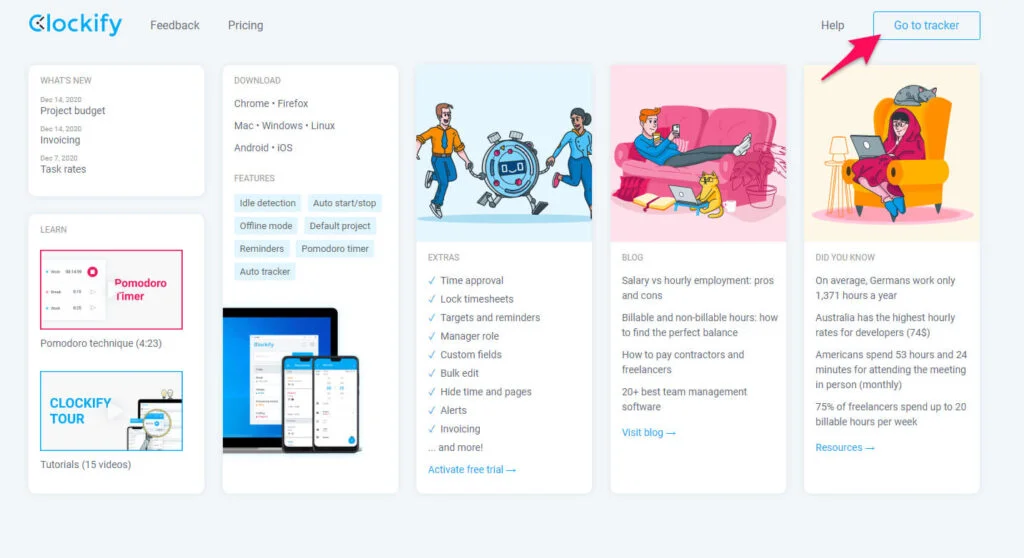
Name the task you’re working on, assign it to a larger project, and click the start button.
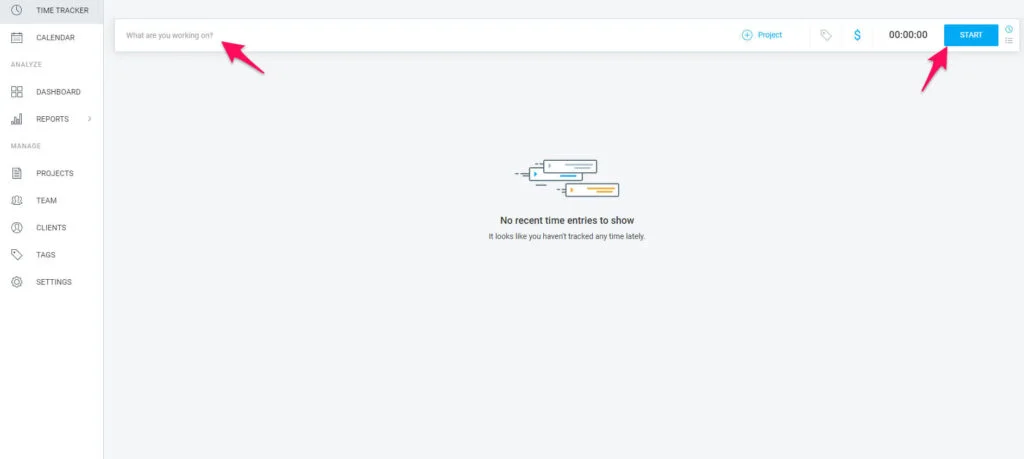
Use the reporting and dashboards to get in-depth data on how much you’ve worked and earned. You can also deliver this to clients.
Per-project
I recommend charging per-project when the scope of work is very clearly defined.
For instance, I use this type of project fee when I’m writing website copy, sales pages, etc.
This is because we know exactly how many pages and approximately how many words are needed.
What I like to do is calculate how many hours I will put into researching, writing, and editing the copy.
I will then bundle this up into a single fee while charging 50% upfront and the remaining after delivery.
Here’s some interesting data on how much copywriters earn annually.
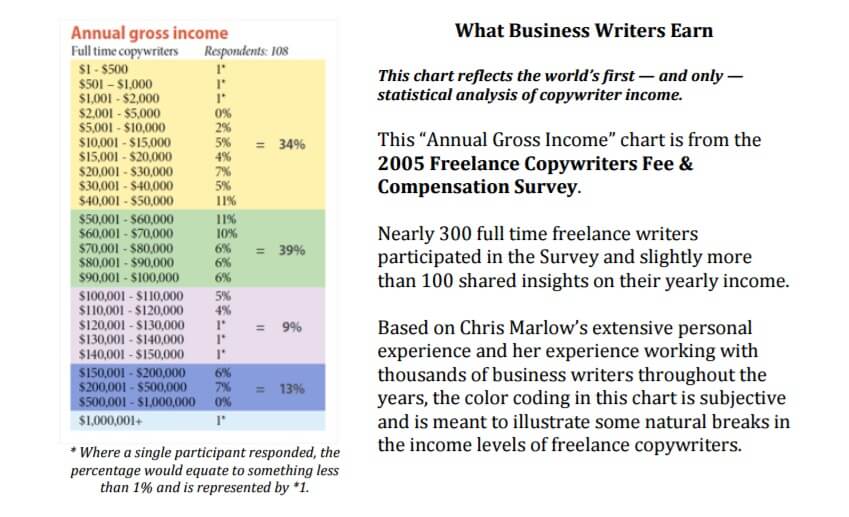
39% of writers are earning somewhere between $50,000–100,000. Pretty solid if you ask me.
The top 9% of writers generate $100,000–150,000.
13% earn $150,000–1,000,000 and one individual makes a jaw-dropping $1,000,000+! 🤯
But you don’t get their billing per word or hour. This is achieved through high per-project rates.
I do not recommend charging per-word as a copywriter. It’s better suited for content as it’s educational and not focused on selling.
However, you can use a per-word calculation to set per-project fees and retainers.
This is rewarding if you’re a fast typer, and it’s very easy to calculate how much you will earn. Clients gain predictability, as well.
Keep in mind it can create a conflict of interest.
What do I mean?
Well, think about it like this…
The client wants to spend as little as possible in some cases.
You want to earn as much as possible.
You might want to write 2,000 words, while the client wants 1,000.
Get my point?
Try to get away from per-word rates if possible. Watch this video from Dan Lok for further insights.
Tips for setting freelance writing rates
Now that you know what some ballpark numbers are for copywriting fees, I’m going to give you some practical advice for setting rates.
Never undercharge (especially early on!)
I recently received an email from an eager copywriter new to the game.
She landed her first big client and asked me if she should charge $50/hour despite it being her first project.
I said, “Hell yeah!”
Here’s the thing…
Most copywriters make the grueling mistake of doing work for free or very cheap in the beginning.
You want to establish a portfolio and get the ball rolling.
The problem is that charging low rates is a guaranteed way to get pain-in-the-ass clients and poor referrals.
It’s a thing every freelancer experiences.
Charging higher allows you to find more professional clients that respect your craft, it boosts income and gives you the confidence you can’t find anywhere else.
Take my free courses on freelance writing and copywriting to learn more.
How much do you need to pay the bills?
What’s the end goal? Six figures? Seven figures plus royalty checks?
Amazing. But, slow your horses.
Don’t be so hasty in the beginning.
I suggest that you make some clear calculations about your life and business expenses.
How much would you need to generate from copywriting to live comfortably?
Aim for that first.
This will create a nice foundation and ensure that you’re not thinking too far ahead.
Let me give you an example.
Let’s say that your monthly expenses are $3,000.
Charging $50/hour, you would need to bill 60 hours total.
Since I’m sure you want to have some money left over every month, that total might be more accurately 70–80 hours/month.
Hey, that’s what some people put in every week! Not too shabby.
See what I mean? Crunch the numbers and find a way to make a living without working like a horse.
Continually increase it with time
I gradually increase how much I charge clients based on my portfolio, genuine skill, confidence, and the results I generate for previous projects.
I’ve always believed in the idea of working less but making more. Who doesn’t want that?
You need to do the same.
Bump up how much you charge—per word, project, or hour—as you get better at your craft.
Give existing clients a heads-up that your rates are going up or remaining at the existing payment level.
Some clients won’t mind if you’re giving them their money’s worth, but some may not have the budget.
Don’t charge more for the heck of it. Increase your freelance writing rates as you genuinely deem fit.
Wrapping up freelance writing rates
How much you pay for a freelance writer or charge yourself depends on a variety of factors.
Firstly, the scope of the individual project is a big one. Is it a single blog post? A 40 page sales letter? The type of copy or content being written, along with how much is needed, drastically changes pricing.
Similarly, the skill and experience of the writer will impact the project. Take a look at my content writing service rates as an example.
Just like anything, pricing usually reflects the quality of service you’ll receive, presuming you’re hiring a writer.
Going on Upwork or trying to hire cheap writers will get you that: cheap quality work .
That’s why I recommend all business owners look at copywriting and content writing as an investment . Good writers will net you serious leads, traffic, and revenue.
The same goes for the opposite perspective as a writer. You shouldn’t settle for cheap rates or clients who are difficult to work with.
Read my guide on how to cold email for getting clients and check out these other articles I’ve published on freelance writing for more information:
- 9 Guaranteed Ways to Secure Freelance Writing Jobs
- How to Get Freelance Writing Jobs and Make 6 Figures From Home
- 5 Freelance Writing Job Boards For Earning Big Cash and Hiring Amazing Writers
- Magazines Looking for Freelance Writers That Pay Up to $1/Word [Ultimate List]
Read Related Content

50+ Useful Blogging Statistics and Facts For Marketers

The A-Z Billboard Copywriting Guide

How to Get Freelance Writing Jobs From Home
Popular Posts
Copywriting Exercises
Content Writing Exercises
Copywriting Niches
Best Copywriting Courses
Copywriting KPIs
Magazines Looking For Writers
AIDA Copywriting
Direct Response Copywriting
Freelance Writing Rates
Copywriting Guides
Product Descriptions
Sales Letters
Newsletters
Advertorials
Social Media
Industry Guides
SaaS Copywriting
Real Estate Copywriting
E-Commerce Copywriting
Financial Copywriting
Fashion Copywriting
Men’s Health Copywriting
Commercial Copywriting
Money Making Guides
How to Start Making Money Online
Making Money With Surveys
Starting an Online Business
Copywriting as a Side Hustle
How to Get a Six-Figure Job
Freelancing vs Full Time Career
$2,000/Month Passive Income Ideas
Join Copy Pro Academy
What my students say.
Listen to what students and people I've worked with have said.

Get copywriting coaching, courses, and a private community for only $20/month!

Carmine Mastropierro is a self-growth, marketing, and business coach that helps people transform their income, value, skills, and success.
- Recommended Resources
- Privacy Policy
- Terms of Service
- Self-Development Website

Why Your Hourly Freelance Writing Rate Matters
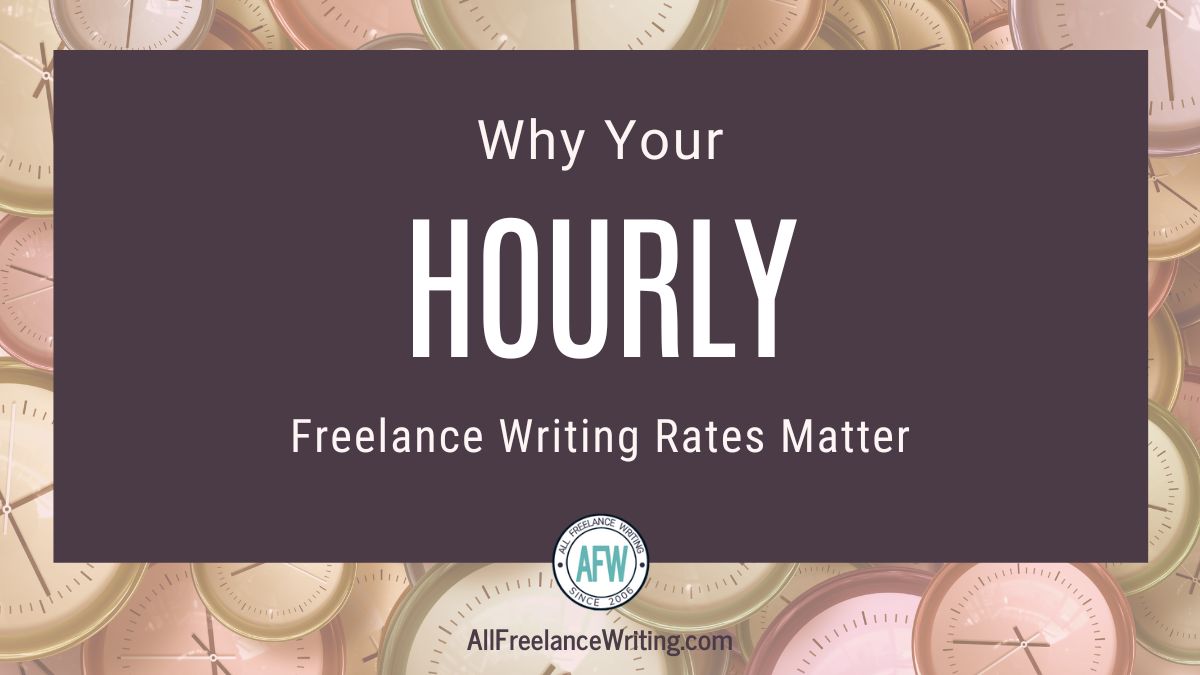
We've talked about freelance writing fees quite a bit here over the years, but today we're going to focus on something that doesn't always get enough love in the freelance writing community: hourly freelance writing rates.
Don't get me wrong. Hourly rates aren't an ideal billing strategy, and we'll talk about why. I can't think of a single case where I'd recommend them for a writing gig.
That said, hourly freelance writing rates are important when it comes to setting other fee types and growing your freelance writing business.
Freelance Writing Rate Types
Let's start by looking at the various types of freelance writing rates you might come across so you understand the alternatives.
Hourly Rates
This is the rate type we're focused on in this piece. It's simply when you bill clients based on the number of hours spent on their project.
Per-Diem Rates
Per-diem rates are daily rates. They're more commonly associated with other types of freelancers, such as photographers who might spend an entire day photographing an event.
It's unlikely you'll come across a situation where a per-diem rate makes sense, but examples might include a gig that requires you to travel or a short-term temporary contract requiring you to work full days for a single client.
Per-Word Rates
This is when you charge clients based on how many written or published words are included in a piece. It's more common in magazine writing gigs, though you'll also see per-word rates advertised for online writing work as well, often on the lower end of the pay spectrum.
Per-Project Rates
Per-project rates are when you have a set fee covering the entirety of a project. For example, this includes per-article rates.
I would also lump per-page rates in here, such as for freelance copywriting projects. That's because you're generally going to convert your standard per-page rate into a larger project fee once you receive the specs from your client.
Retainer Fees
A retainer fee is an up-front payment covering a set timeframe, guaranteeing you a certain amount of pay and guaranteeing the client a certain commitment from you.
For example, a freelance blogger might charge a flat monthly retainer covering content strategy, a specific number of blog posts, responding to comments, and writing related social media updates over the course of each month.
The Rate Types I Strongly Recommend
I highly recommend freelance writers stick to per-project rates and retainer fees whenever possible.
Retainers amount to guaranteed income, committed up-front, for a particular time period. And per-project rates allow you to set standards that can be customized as necessary.
Plus, both reward long-term commitment to clients, specialties, and project types by having built-in mechanisms for regular "raises." We'll look more at this shortly.
While I'm not a big fan of the other rate types mentioned, hourly rates are particularly problematic for most freelance writing projects. Let's look at why that is.
Why Hourly Billing is a Bad Idea for Freelance Writers
There are some important perks to being a freelance professional. For example:
- You get to set your own rates.
- Only you decide when and where you work.
- You have the choice to accept or reject individual projects.
In general, freelance writing also means you're paid based on what you deliver, not the amount of time a client thinks their projects should require.
This changes with hourly freelance writing rates.
How Hourly Rates Can Pit You Against Your Clients
When you charge hourly fees, it's in the client's interest to minimize the amount of time you spend on their projects. It can also be in the freelancer's interest to drag things out.
Of course you would never do that.
But other freelancers have. And these tensions do exist.
Have you ever seen an advertised gig where the potential client tells writers how long it should take them to write each article? I see these often when curating leads for this site's freelance writing job board .
Why would a client post something like that?
Perhaps they felt a previous freelancer burned them by taking their sweet time.
Maybe they wrote a few (not exactly professional) articles themselves (intimately knowing their business and market), and they're only willing to pay for that same time commitment without allowing time for necessary knowledge transfer.
Or they might just be cheapskates. Perhaps they hired lowball writers in the past and think that's the actual going rate of professionals.
No matter the reason, their perception should have no bearing on how you do your work, and it certainly shouldn't influence your pay.
Hourly Rates and Raises
Charging clients on an hourly basis can also pit you against each other as you get better at your job and seek pay increases.
You always have the option of telling any client "I've increased my rates, and here's what I charge moving forward." They always have the option to hire someone else.
Sometimes that's best for everyone. You might already be at their maximum available budget. They might not see a high enough ROI to justify paying more. And you might be ready for new challenges and higher pay elsewhere.
But when you focus on per-project rates, for example, raises aren't entirely reliant on you actually charging more.
For example, let's say you handle a company's entire content strategy. You write their blog posts, marketing copy, social media content, email newsletters, and long-form content like white papers.
If you bill hourly for all of this, increasing your hourly rate could be a hard sell.
But when you bill on a per-project or retainer basis, the more you get to know the client and their target market or audience, the faster the work will get. This is natural.
If you're doing a similar amount of work each month, but spending less time on that work as you become more familiar with the client, industry, project types, or style required, you earn more each working hour even when you don't outright charge more.
Know (& Set) Your Hourly Freelance Writing Rate
Even though I advise against charging hourly freelance writing rates, you should still know what yours is, and you should still set your target hourly fees.
Those hourly rates are how you set per-project, per-word, or retainer fees.
If you're setting rates by pulling numbers out of thin air (or looking at publicly-advertised rates as inspiration when they're notoriously low), you're doing yourself a disservice.
Instead, you want to know how much your current projects pay for the time you're devoting to them. And you want to have a target hourly rate that serves as the minimum any other rate type should cover.
This is what I refer to as my "get out of bed rate." It's the minimum a gig has to pay per-hour for me to drag my ass out of bed and work on something for someone else's business rather than my own projects.
For example, let's say you're a relatively new freelance writer. The minimum I recommend charging is around $50 per hour.
Let's also say you write fairly short web content, and you turn around most articles or blog posts in about three hours (from research to final revisions). You would set a standard per-project / per-article rate of $150.
This would be a base rate you could build upon. For instance, if most of the articles you write don't require interviews or extensive research, you would increase that base rate for any project that does.
Side Note on Freelance Rates: If $50 per hour sounds high to you for a relatively new freelancer, you might be caught up thinking about hourly rates in employee terms. Freelancing is different. Your hourly rate is based on billable hours, but it has to cover all working hours (marketing, admin, etc. on top of the time you spend on client work). Those hourly rates should also cover everything an employer traditionally does (which are often forgotten when talking only about salaries). That includes health insurance, sick time, vacation days, and the employer's side of tax payments which now come directly from you. If you haven't accounted for these things, you're probably under-charging.
How to Determine Your Current Hourly Freelance Writing Rate
If you want to know how much you earn per-hour now, it's a simple matter of time tracking.
Spend a few weeks tracking all your working time. Make sure you include both client projects (calls with clients, emails, research, writing, editing, etc.) and other work tasks (your professional blog, marketing activities, billing... everything ).
This will help you figure out how much you're earning for each billable hour for each client you have. It won't always be the same.
You'll also see your average hourly rate per billable hour, and you can figure out how much you make for each working hour, client projects or not.
If you're happy with what you find, great. Use that average billable hourly rate to set your standard article or project rates.
If not, it's time for a change. And that means setting a new target hourly rate.
How to Set Your Target Hourly Freelance Writing Rate
If you want to know what you really need to charge to reach your goals, try my freelance writing rate calculator .
The simple mode lets you base calculations on your target yearly income.
My past research showed you need to charge at least 30-40% more as a freelancer to earn the equivalent of an employee in a similar position.
So, for example, if you left a $50k per year job to freelance and you want to earn the same amount, you would set a freelance target closer to $70k.
And if you're a specialist, you should be earning a premium on top of that. So increase your yearly target from there. Run it through the calculator to see what that comes to as an hourly client rate. It might be higher than you expect.
The advanced mode goes beyond this. People often underestimate what they need to earn when they aren't used to the differences between freelance pay and employee pay.
The advanced calculator gets into the nitty gritty, letting you account for specific expenses and savings goals to find out what you need to earn to reach your overall financial targets.
Once you know that, you can translate that into your billable hourly target and set project rates accordingly.
Ways to Increase Your Hourly Freelance Writing Rate
You might not be charging clients an hourly fee, but tracking your hourly rates can make it easier to increase what you make. And you have several options to increase your hourly earnings. For example:
- Increase the rates you charge directly. If you're worried about losing clients, raise them on new clients only at first, then raise it on older clients when you've shown there's enough demand at your new rates (or replace them). Don't forget to do this if anything changes about your value proposition (a new degree or certification for example).
- Work at optimizing your process on your most common types of jobs to decrease the amount of time each requires.
- Focus on digging into your long-term clients' businesses to also cut down on the time each gig requires (know who they're writing for, become more knowledgeable about their niche or industry, etc.).
- Along those lines, make an effort to build more long-term client relationships so you aren't starting from scratch with most new gigs.
- Group related services together into retainer packages (this can be as simple as X articles per month or a full content strategy / creation / management contract). When you batch tasks like this, it can be easier to optimize your work. Batch outlines and research for all a client's posts for example.
When you know your real hourly income and you find ways to get more done in less time ("work smarter, not harder"), you develop a system that provides built-in raises between your actual price increases.
While hourly freelance writing rates might not be the best rate structure for most writers, it pays to understand what your hourly rate is. Using an hourly rate target to set project-based and other fees will help you stay on a the right path to reaching your professional goals.
Get More Content Like This in Your Inbox
Did you enjoy this post? If so, please subscribe to the All Freelance Writing newsletter where you'll be notified of new blog articles and receive subscribers-only content.
Subscribe now.
Leave a Comment Cancel reply

73 Sites That Pay You To Write Content
D o you want to work from home as a writer? If so, you've definitely landed on the right page. Below is a huge listing of companies that hire freelance writers to work from home either on an ongoing or semi-regular basis. Some require past experience, and some don't.
The full list is below.
Get Paid to Write For ...
A Pass Education - Possibly worldwide. Educational assessment writing. Minimum of a bachelor's degree required plus 2-5 hours of availability per day. Job listings say $25 to $45 hourly is possible.
A List Apart - They look for web industry content, pays between $50 and $200 a piece.
Athlon Sports - They are regularly looking for contributors to write about sports topics. Rate of pay not listed.
iWorkWell - Usually looking for subject matter experts to write and edit instructional articles. Pays up to $195 for content.
Verblio - Read Verblio Review - Possibly open worldwide. Write blog posts for Verblio's clients. If the client likes your post, you get paid.
BookBrowse - Get paid to write book reviews. They hire a pool of regular contributors who review about one book per month. They describe the payment as "modest," but don't give an exact number.
Buy Keyword Articles - Read BKA Review - US only. Pays every two weeks with Paypal. Pays from one to five cents a word with most writers averaging $9 to $14 hourly.
ClearVoice - You have to wait to be matched to an assignment after applying. ClearVoice allows you to set your own rates.
Content Remarketing - Always on the lookout for freelance writers with demonstrated content writing expertise.
Content Runner - Possibly US only. This is an article marketplace where you can write articles and post them for sale. They pay with US bank account. You can find the writer registration page by going to the bottom of their main website and looking under the "Useful Links" heading.
Copy Press - Read Copy Press Review - Worldwide. Hires freelance writers in United States, Canada, United Kingdom, and Australia. Pays with direct deposit or Paypal twice a month.
Cracked - Possibly worldwide. They claim to pay $100 for your first accepted article. You will also get a byline, so it could be good for exposure.
Crowd Content - Read Crowd Content Review - Accepts writers from US, CA, UK, and AU, possibly other countries. Earn 2 to 6.6 cents per word depending on your writer level.
DesertUSA - A website about desert ecosystems, including scientific articles, historical content, and stories about living in the harsh terrain. Payment is $50 dollars for articles they choose to publish, and you have to submit photos along with the article.
Distance Web - Experienced writers desired for generating copy for ads, web sites, and email marketing initiatives.
Doctor of Credit - This site focuses on deals and consumer credit issues. You submit an article idea, and if you're accepted you get paid $50. If they like your work well enough you might get taken on as a regular contributor.
EditFast - Write about EditFast following one of their three guides with keywords and earn $10.
Fansided - Must have knowledge of NBA to write for this site. Pay is not listed, but the site says they offer competitive pay-per-pageview revenue sharing (eight published pieces per month minimum) as well as flat-rate payment options.
Fiverr - Read Fiverr Review - You can offer your writing services on Fiverr and get paid. While there is a lot of competition since many people do this, it is a way to earn some extra money here and there. You can have a portfolio on your profile to showcase your work, and you will be rated by your clients. The higher your rating, the more likely you will have repeat business.
getAbstract - This is a self improvement website, looking for educational content related to that subject. According to rumor they sometimes pay over $300 per article, but pay is not mentioned on their contact form.
Get a Copywriter - Read Get a Copywriter Review - Worldwide. Work at home copywriting. Pays $5 to $9 for every 100 words.
Great Content - Worldwide. This company is always looking for American writers to create great content for their clients. You can request your pay once you have earned $25.
Make a Living Writing - This is a high-quality, popular site on freelance writing that does pay for guest posts. Currently, they pay $75 to $150 for guest posts. You can pitch ideas on a variety of writing topics, including blogging, copywriting, marketing, and more.
HotGhostWriter - Read HotGhostWriter Review - They are looking for writers that can commit and are looking to work long-term. Pay rate is not disclosed on website.
Hire Writers - Read Hire Writers Review - Worldwide. Get paid up to $20 per article you write once you become established on HireWriters.com.
Homestead.org - Write articles about homesteading and get paid. They are currently offering $100 for well-written manuscripts.
The Hoth - Read The HOTH Review - US only. Regularly hiring native English speaking writers to create SEO content. Pay not listed, but it appears they prefer that you've attended a US based college. They pay with Paypal.
How Stuff Works - Pay is $100+ per article. They are extremely selective.
Income Diary - This is a site focused on making money online, creating websites, and things of that nature. They accept submissions, and pay up to $200 dollars per article.
JustParents - They're in need of articles from contributors related to parenting and pregnancy. Avoid pitching topics they've already covered at some point in the past. There is no mention of the pay rate.
Kirkus Media - Read Kirkus Review - Worldwide. Hires freelance book reviewers, editors, and copywriters on a freelance basis. Work from anywhere.
Knitty - If you enjoy knitting and have advice to share on that topic, then this website might pay you to write articles. They like for writers to add some personality in their articles, and a little bit of humor is fine. The pay is $175 to $200 per published submission.
Life Tips - Worldwide. Needs SEO Specialists, copywriters, and editors.
Listverse - Read Listverse Review - Worldwide. Will pay $100 for accepted 1,000 word lists. Please note that Listverse does claim all rights to submitted content (even if not published).
LovetoKnow - Rate of pay not listed. Must provide samples. They regularly accept writers with expertise in the topics they publish content on.
Medium - You can write articles on just about any topic for Medium and get a byline! Many bloggers and authors looking to build up their portfolios and online presences do use Medium for those purposes. Medium will also pay you for your content.
Metro Parent - A website for parents living in Michigan, covering local issues. It sounds like this is an ongoing job where you can get consistent work potentially, but they also accept submissions. Pay ranges from $40 to over $200.
Modern Farmer - Like the name suggests, this is a blog about farming in the modern world. You have to pitch article ideas, and see if the bite. The pay rate is not listed, but rumor has it that they offer around $150 for articles they accept.
Morning Chores - This is a website focused on homesteading and self-sufficiency. They pay $50 per published article.
New Reach Agency - Guest posting outreach. They pay $15-40/hour depending on your level of expertise on the subject matter, required post-writing editorial work, and the niche.
Online Writing Jobs - US only. Get paid up to $50 an article. Weekly payments made via Paypal or mailed check.
Motherly - They need articles about parenting, and sometimes prefer content with a bit of an irreverent edge. You can submit anything you like without having to pitch it. They pay $50 for work they accept, and you aren't eligible for payment until you've had two pieces published on their site.
Pretty Designs - They describe themselves as a magazine dedicated to women and women's interests. They're looking for articles on hair, health, beauty, and literature, along with other related topics. They want bloggers who can write multiple articles on an ongoing basis. The pay rate is not mentioned.
Ranker - Read Ranker Review - Ranker is regularly looking for freelance list-makers. Must be able to do 5 to 30 lists per week. Rate of pay is not listed.
Reason - Political site with a Libertarian slant that pays for freelance submissions. Rate is not listed, and they do not like unsolicited manuscripts.
RiseSmart - US and Canada. Hires remote resume writers. Pays hourly to start.
Screen Rant - Worldwide. Has a regular need for entertainment writers. They claim this is good part-time pay.
Search Influence - Possibly worldwide. Make roughly $15 an hour writing SEO content. They supply the articles you need to write plus keywords & other info. Pretty much everything comes with a 24 hour turnaround time.
Shoutvox - ShoutVox is regularly looking for freelance writers to help create engaging content on a wide variety of topics, including finance, technology, pop culture, and entertainment. Pays $18 to $30 hourly.
Sitepoint - This company is looking for writers to join its pool of contributors. They produce monthly articles based around particular themes, teaching different skills. The pay rate is not listed.
Skyword - Worldwide. Some upfront pay but also offers revenue share.
Talent, Inc. - Worldwide. Get paid $20 per project to create resumes for Talent, Inc.'s clients.
Tempesta Media - This company regularly looks for freelance, remote writers to cover health, IT, technology, corporate insurance, tax, business insurance, and many other topics for its clients. Pay rate is not disclosed.
Textbroker - Read Textbroker Review - Worldwide (several countries). Textbroker hires beginners & experienced writers to create content for their clients. Pay is weekly via Paypal on Fridays.
Textbroker UK - The UK version of the Textbroker website. Hiring writers from the UK, Australia, Canada, and Britain.
TextRoyal.com - Work from anywhere. Writing opportunities available across many different categories. Funds are available to cash out once you've earned at least $10. They pay up to $0.03 per word.
Theme Park Tourist - They will pay you $50 for short form articles consisting of between 750-1000 words. This is a long-term commitment if you're accepted, not a site to just write articles for occasionally. They make payments at the end of each month.
Upwork - Read Upwork Review - Worldwide. Always accepting freelance writers. You must bid on the work you're interested in.
Vida - Looking for remote creative writers. They are in the business of creating dating profiles and matchmaking. Rate of pay is not listed.
VQR - They publish, literary fiction, poetry, along with articles about literary art and cultural criticism. Quality standards are very stringent. But the pay is very nice. $1000 dollars for short fiction and essays. $200 dollars for poems.
WebFX - Regularly looking for remote copywriters. Hourly Rates from $18 to $21. An annual income equivalent to $42k to $46k (potentially higher based on work experience).
WL Marketing - Maybe open worldwide. This a company that provides SEO services. They appear to have an ongoing need for article writers.
Word Gigs - US residents can earn between $1 and $4 for blurbs and short articles.
Words of Worth - Read Review - Open to US, Canada, France, Germany, UK and more. Pays out once a month via bank transfer.
Wow Women - This site specializes in content aimed at women readers, written by women. You have to send in a query letter about any article ideas you have before submitting, and they pay between $50 and $80 dollars.
Writer Access - US only. Similar to Textbroker, but pay is higher and there is less work. Pays out once a month if you have at least $10 earned.
Writer's Domain - Hires English, French, and Spanish speaking writers on occasion. Pays with Paypal.
Zerys - Possibly worldwide. This is a content site that is usually open to writers.
Mental Floss - Mental Floss is usually looking for writers to contribute lists and/or short features across a wide variety of different categories including entertainment, history, science, and more. They do give you a bio and pay you for accepted content ($125 to $150 starting rates).
Freelance Mom - Accepts guest post submissions between 900 and 1,500 words. Pay is $75 to $100 via Paypal, with monthly bonuses available if your article is the most shared.
Consumer Press - This site needs people to write about products, stores, consumer topics, etc. and in return they give 70 percent Adsense revenue share.
Her View From Home - Accepts writers to write faith and parenting articles. Geared toward women. You earn a certain amount per views of your article. So if you want to do well with your content, you need to promote it.
Unanchor - Get 50 percent of revenue share from your published travel itineraries sold.


IMAGES
VIDEO
COMMENTS
Learn how to budget for content writing projects on Upwork, a platform that connects freelancers and clients. Find out the median hourly rate, what goes into content writing, and how to hire the right talent.
Learn how to set your rates for freelance writing based on your experience level, project type, and market demand. Find out the average hourly, per-word, and per-project rates for different types of writing and how to negotiate with clients.
Content Writer Hourly Rate. As a comparison, Payscale shows that US-based freelance copywriters make an average of $29.29 per hour, with prices ranging between $14.57 to $72.72. On the other hand, Payscale shows that freelance editors make an average of $25.04 per hour, with rates ranging from $12.51 to $65.64.
What criteria freelancers use to set rates and charge higher rates. How much freelance content writers charge for different types of content. ... The most popular hourly rate for freelance writers was over $100. How much do you charge per hour? 2. Over 60% of freelance writers charge over $50 per hour.
Learn about different types of freelance writer rates, such as hourly, flat, word, and retainer rates, and how to calculate them. Find out the average rates for writing and the impact of AI on the market.
According to labor statistics, in 2021 writers and authors were making $69,510/year. This is roughly $1,448 per week. Depending on the type of content and what you charge, your rate can be anywhere between $.15/word to $.50/word. As an hourly rate, it's around $33/hour. Technical writers earn around $81,470/year.
The average hourly pay for a Freelance Writer is $25.30 in 2024. Visit PayScale to research freelance writer hourly pay by city, experience, skill, employer and more.
Learn how freelance writers charge for their services and what factors affect their rates. Compare different pricing models and see the average rates for various types of content writing.
And the first thing is to decide how much you want to earn per year. Once you know that, you can divide the amount by 12 to come out with a pseudo-monthly salary. Divide that by the 160-hour typical working month and walla - you have an hourly rate for all your toil. But that should only serve as a rough guide, as we've hinted to above.
Rates vary depending on the type of client you work with, the length of the project, the complexity of the material, as well as the writer's experience. The average hourly rate for an freelance content writer ranges from $25 to $50 per hour. An beginner level writer may charges the little as an $15 an hour, while a more experienced writer can ...
Learn from a survey of 213 freelance writers on their rates, niches, and sources of high-paying gigs. Find out the average freelance writing rate for blog posts, whitepapers, and other services, and how to charge more for your value.
It's essential to have a grasp on the average rates for freelance content creators, so you can set competitive and accurate rates for your services. ... Average Hourly Rate; Freelance Writer: $15 - $75: Copywriter: $20 - $100: Content Strategist: $30 - $150: Social Media Content Creator: $15 - $30: Graphic Designer: $20 - $70: Video ...
In fact, of the writers who charged the highest rate - $100+ per hour - most were experts (41%). The findings were the same for per-word rates. Of the freelancers who charged between $0.01 and $0.10 per word, 32% were beginner writers, while only 0.8% were experts.
A Freelance Content Writer in your area makes on average $22 per hour, or $1.00 (43.150%) less than the national average hourly salary of $23.27. Virginia ranks number 7 out of 50 states nationwide for Freelance Content Writer salaries.
The average content writing hourly rate varies depending on the niche and the experience level of the writer. However, you can expect to earn anywhere from $15 to $40 per hour as a beginner, and this can increase to $50-100 per hour for more experienced content writers with greater expertise.
Freelance journalist rates. Journalism is one of the best money-making niches as a writer. Writing in magazines tends to have some of the highest rates available, ranging from $0.50-3/word. If a writer were to produce a 1,000 word article at $3/word, that's $3,000! Typically journalism is billed on a per-word or per-article basis since it's ...
2 Your level of experience and portfolio. Another factor that influences your hourly rate is your level of experience and portfolio. The more experience you have as a freelance writer, the more ...
If $50 per hour sounds high to you for a relatively new freelancer, you might be caught up thinking about hourly rates in employee terms. Freelancing is different. Your hourly rate is based on billable hours, but it has to cover all working hours (marketing, admin, etc. on top of the time you spend on client work).
ClearVoice allows you to set your own rates. Content Remarketing - Always on the lookout for freelance writers with demonstrated content writing expertise. ... Hourly Rates from $18 to $21. An ...
90%. ₹1k. The average hourly pay for a Freelance Writer is ₹403.37 in 2024. Hourly Rate. ₹100 - ₹1k. Bonus. ₹990 - ₹244k. Profit Sharing. ₹1k - ₹138k.
In addition to being a writer at Forbes, she works as a freelance architectural designer specializing in residential design. ... The average hourly rate is in the $100 to $200 ... all content is ...